2014年全国高考英语试题及答案-大纲卷
2014年全国高考英语试题及答案
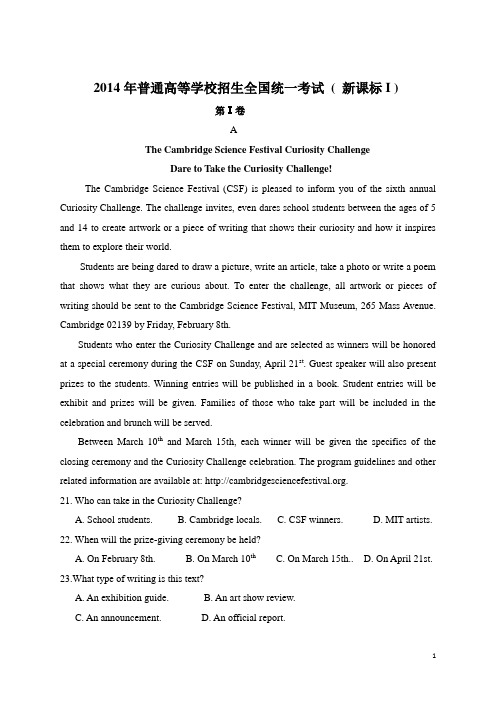
2014年普通高等学校招生全国统一考试( 新课标I )第Ⅰ卷AThe Cambridge Science Festival Curiosity ChallengeDare to Take the Curiosity Challenge!The Cambridge Science Festival (CSF) is pleased to inform you of the sixth annual Curiosity Challenge. The challenge invites, even dares school students between the ages of 5 and 14 to create artwork or a piece of writing that shows their curiosity and how it inspires them to explore their world.Students are being dared to draw a picture, write an article, take a photo or write a poem that shows what they are curious about. To enter the challenge, all artwork or pieces of writing should be sent to the Cambridge Science Festival, MIT Museum, 265 Mass Avenue. Cambridge 02139 by Friday, February 8th.Students who enter the Curiosity Challenge and are selected as winners will be honored at a special ceremony during the CSF on Sunday, April 21st. Guest speaker will also present prizes to the students. Winning entries will be published in a book. Student entries will be exhibit and prizes will be given. Families of those who take part will be included in the celebration and brunch will be served.Between March 10th and March 15th, each winner will be given the specifics of the closing ceremony and the Curiosity Challenge celebration. The program guidelines and other related information are available at: .21. Who can take in the Curiosity Challenge?A. School students.B. Cambridge locals.C. CSF winners.D. MIT artists.22. When will the prize-giving ceremony be held?A. On February 8th.B. On March 10thC. On March 15th..D. On April 21st.23.What type of writing is this text?A. An exhibition guide.B. An art show review.C. An announcement.D. An official report.The clue of the passage1.What should be done to enter the challenge ?________________________________________________________________________ 2.考点总结与反思:I. 找出该篇你自己认为需要掌握或重要的单词、词组、句型:___________________________________________________________________________ ___________________________________________________________________________ ___________________________________________________________________________ ___________________________________________________________________________ ___________________________________________________________________________ II. 该篇高考考纲要求的单词、词组、句型:dare to do 敢做…be pleased to do 高兴做… inform sb of sth 通知某人某事inspire sb to do 鼓励某人做某事be selected to do 被选出做某事ceremony 典礼publish 出版available 可得的BPassenger pigeons(旅鸽)once flew over much of the United States in unbelievable numbers. Written accounts from the 18th and 19th centuries described flocks(群)so large that they darkened the sky for hours.It was calculated that when its population reach its highest point, there were more than 3 billion passenger pigeons – a number equal to 24 to 40 percent of the total bird population in the United States, making it perhaps the most abundant birds in the world. Even as late as 1870 when their numbers had already become smaller, a flock believed to be 1 mile wide and 320 miles (about 515 kilometers) long was seen near Cincinnati.Sadly, the abundance of passenger pigeons may have been their undoing. Where the birds were abundant, people believed there was an ever-lasting supply and killed them by the thousands. Commercial hunters attracted them to small clearings with grain, waited untilpigeons had settled to feed, then threw large nets over them, taking hundreds at a time. The birds were shipped to large cities and sold in restaurants.By the closing decades of the 19th century, the hardwood forests where passenger pigeons nested had been damaged by American s’ need for wood, which scattered(驱散)the flocks and forced the birds to go farther north, where cold temperatures and spring storms contributed to their decline. Soon the great flocks were gone, never to be seen again.In 1897, the state of Michigan passed a law prohibiting the killing of passenger pigeons, but by then, no sizable flocks had been seen in the state for 10 years. The last confirmed wild pigeon in the United States was shot by a boy in Pike County, Ohio, in 1900. For a time, a few birds survived under human care. The last of them, known affectionately as Martha, died at the Cincinnati Zoological Garden in September 1, 1914.24. In the 18th and early 19th centuries, passenger pigeons _______.A. were the biggest bird in the worldB. lived mainly in the south of AmericaC. did great harm to the natural environmentD. Were the largest population in the US25.The underlined word “undoing” probably refers to the pigeons’ _______.A. escapeB. ruinC. liberationD. evolution26.What was the main reason for people to kill passenger pigeons?A. To seek pleasure.B. To save other birds.C. To make money.D. To protect crops.27 What can we infer about the law passed in Michigan?A. It was ignored by the public.B. It was declared too late.C. It was unfair.D. It was strict.考点总结与反思:I. 找出该篇你自己认为需要掌握或重要的单词、词组、句型:___________________________________________________________________________ ___________________________________________________________________________ ___________________________________________________________________________ ______________________________________________________________________________________________________________________________________________________ II. 该篇高考考纲要求的单词、词组、句型:Darken v. 使…变黑account n.账户、解释calculate v计算、估算abundant adj.丰富的abundance n充裕、丰富undoing n毁灭、取消at a time 一次commercial adj.商业的contribute to sth. 对..做贡献prohibit v禁止、阻止confirmed adj.确认的CA typical lion tamer (驯兽师) in people’s mind is an enter tainer holding a whip (鞭子)and a chair .The whip get all of the attention , but it’s mostly for show .In reality , it’s the chair that does the important work .When a lion tamer holds a chair in front of the lion’s face , the lion tries to focus on all four legs of the chair at the same time .With its focus divided , the lion becomes confused and is unsure about what to do next .When faced with so many options , the lion chooses to freeze and wait instead of attacking the man holding the chair. How often do you find yourself in the same position as the lion ? How often do you have something you want to achiever (e,g. lose weight , start a business , travel more ) –only to end up confused by all of the options in front of you and never make progress ?This upsets me to no end because while all the experts are busy debating about which option is best , the people who want to improve their lives are left confused by all of the conflicting information .The end result is that we feel like we can’t focus or that we’re focused on the wrong things , and so we take less action , make less progress , and stay the same when we could be improving .It doesn’t have to be that way .Anytime you find the world waving a chair in your face , remember this :All you need to do is focus on one thing .You just need to get started .Starting before you feel ready is one of the habits of successful people .If you have somewhere you want to go , something you want to accomplish , someone you want to become ….take immediate action .If y ou’re clear about where you want to go , the rest of the world will either help you get there or get out the way .28. Why does the lion tamer use a chair?A. To trick the lion.B. To show off his skill .C. To get ready for a fight.D. To entertain the audience.29. In what sense are people similar to a lion facing a chair?A. They feel puzzled over choices.B. They hold on to the wrong things.C. They find it hard to make changes.D. They have to do something for show.30. What is t he author’s attitude towards the experts mentioned in paragraph 3?A. TolerantB. DoubtfulC. RespectfulD. Supportive31. When the world is “waving a chair in your face”, you’re advised to_____.A. wait for a better chanceB. break your old habitsC. make a quick decisionD. ask for clear guidance考点总结与反思:I. 找出该篇你自己认为需要掌握或重要的单词、词组、句型:___________________________________________________________________________ ___________________________________________________________________________ ___________________________________________________________________________ ___________________________________________________________________________ ___________________________________________________________________________ II. 该篇高考考纲要求的单词、词组、句型:DAs more and more people speak the global languages of English, Chinese, Spanish, and Arabic, other languages are rapidly disappearing. In fact, half of the 6,000-7,000 languages spoken around the world today will likely die out by the next century, according to the United Nations Educational, Scientific, and Cultural Organization (UNESCO).In an effort to prevent language loss, scholars from a number of organizations- UNESCO and National Geographic among them –have for many years been documenting dying languages and the cultures they reflect.Mark Turin, a scientist at the Macmillan Center, Yale University, who specializes in the languages and oral traditions of the Himalayas, is following in that tradition. His recently published book, A Grammar of Thangmi with an Ethnolinguistic Introduction to the Speakers and Their Culture, grows out of his experience living, looking and raising a family in a village in Nepal.Documenting the Tangmi language and culture is just a starting point for Turin, who seeks to include other languages and oral traditions across the Himalayans reaches of India, Nepal, Bhutan, and China. But he is not content to simply record these voices before they disappear without record.At the University of Cambridge Turin discovered a wealth of important materials- including photographs, films, tap recordings, and field notes- which had remained unstudied and were badly in need of care and protection.Now, through the two organizations that he has founded-the Digital Himalaya Project and the World Oral Literature Project- Turin has started a campaign to make such documents, found in libraries and stores around the world, available not just to scholars but to the younkers.Generations of communities from whom the materials were originally collected. Thanks to digital technology and the widely available Internet. Turin notes, the endangered languages can be saved and reconnected with speech communities.32.Many scholars are making efforts to _____.A.promote global languagesB. rescue the disappearing languagesC. search for language communitiesD. set up languages research organizations.33.What does “that tradition” in Paragraph 3 refer to?A.Having first records of the languagesB. Writing books on language searchingC.Telling stories about language usersD. Linking with the native speakers34.What is Turin’s book based on?A.The cultural statics in India.B. The documents available at Yale.C.His language research in Britain.D. His personal experience in Nepal.35.Which of the following best describe Turin’s Work?A.Write sell and donate.B. Record, repeat and reward.B.Collect, protect and reconnect. D. Design, experiment and report.考点总结与反思:I. 找出该篇你自己认为需要掌握或重要的单词、词组、句型:___________________________________________________________________________ ___________________________________________________________________________ ___________________________________________________________________________ ___________________________________________________________________________ ___________________________________________________________________________ II. 该篇高考考纲要求的单词、词组、句型:第二节(共3小题,每小题3分,满分15分)根据短文内容,从短文后的选项中选出能填入空白处的最佳选项,选项中有两项为多余选项。
2014年全国大纲卷高考英语试卷含答案试卷
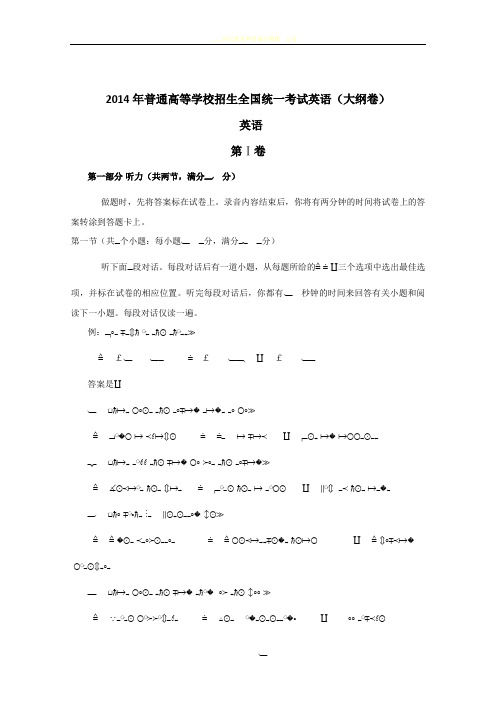
2014年普通高等学校招生全国统一考试英语(大纲卷)英语第Ⅰ卷第一部分 听力(共两节,满分 分)做题时,先将答案标在试卷上。
录音内容结束后,你将有两分钟的时间将试卷上的答案转涂到答题卡上。
第一节(共 个小题:每小题 分,满分 分)听下面 段对话。
每段对话后有一道小题,从每题所给的 三个选项中选出最佳选项,并标在试卷的相应位置。
听完每段对话后,你都有 秒钟的时间来回答有关小题和阅读下一小题。
每段对话仅读一遍。
例:£ £ £答案是第二节(共 小题:每小题 分,满分 分)听下面 段对话或对白,每段对话或对白后有几个小题,从题中所给的 、 、 三个选项中选出最佳选项,并标在试卷的相应位置,听每段对话或独白前,你将有时间阅读各个小题。
每小题 秒钟;听完后,各小题给出 秒钟的作答时间。
每段对话或独白读两遍。
听第 断材料,回答第 、 题。
听第 段材料,回答第 、 题听第 段材料,回答第 至 题。
听第 段材料,回答第 至 题。
听第 段材料,回答第 至 题。
第二部分 英语知识运用 共两节,满分 分单项填空 共 小题 每小题 分,满分 分从 、 、 、 四个选项中 选出可以填入空白处的最佳选项,并在答题卡上将该项涂黑。
第二节 完形填空 共 小题;每小题 分,满分 分阅读下面短文 从短文后各题所给的四个选项 、 和 中 选出可以填入空白处的最佳选项,并在答题卡上将该项小涂黑。
(绳)(峭壁)(裂缝)第三部分 阅读理解(共 小题,每小题 分,满分 分阅读下列短文,从每题所给的四个选项 和 中,选出最佳选项 并在答且卡上将该项涂黑。
(护照)(垃圾桶)(文件)(环境)(排放)(回收利用)(趋势)接触 (文化)地铁避免··(特工) (间谍)(技术)第 卷第四部分 写作 共两节 满分 分第一节 短文改错 共 小题;每小题 分,满分 分此题要求改正所给短文中的错误。
对标有题号的每一行作出判断 如无错误 在该行右边横线上画一个勾 √ 如有错误 每行只有一个错误 ,则按下列情况改正此行多一个词 把多余的词用斜线 划掉。
2014年高考英语大纲卷-答案

2014普通高等学校招生全国统一考试(全国大纲卷)英语答案解析第Ⅰ卷第一部分听力第一节1.【答案】A2.【答案】B3.【答案】C4.【答案】B5.【答案】A第二节6.【答案】B7.【答案】C8.【答案】A9.【答案】C10.【答案】A11.【答案】A12.【答案】C13.【答案】B14.【答案】C15.【答案】A16.【答案】C17.【答案】B18.【答案】C19.【答案】A20.【答案】B第二部分英语知识运用第一节单项填空21.【答案】A【解析】前者因为打碎了玻璃杯而道歉。
根据空后面的I've got plenty可以推测出对方并没有在意。
因此应该选择具有安慰口吻的话语。
所以只能选择A项,forget it此处意为“没关系”。
B项意为“不客气”。
C项意为“请自便”。
D项意为“原谅我”。
22.【答案】C【解析】unless引导条件状语从句,因此此处必须填写动词形式。
money和find之间是动宾关系,所以用被动形式。
因为主句用一般将来时形式,所以从句应该用一般现在时形式。
23.【答案】B【解析】因为前面出现了there be结构,所以此空需要用非谓语动词形式。
空后面出现了carry的宾语,所以不能用被动形式。
D项不用来作定语。
因此答案只能选择B项,现在分词作后置定语修饰airplanes。
24.【答案】C【解析】根据but后面句子中的around 1565可知,此空应该选择C项。
句意:到底马铃薯是什么时候传到欧洲的现在还不确定,但是极有可能是在1565年左右。
25.【答案】B【解析】这里应该用it代替前文出现的that at the door表示不明确性别身份或者是心目中的人时要用代词it。
26.【答案】D【解析】根据句末的as well的提示可知,此处应该是not only…(but)…as well句型,当该句型的not only位于句首时,句子应该用部分倒装形式。
27.【答案】D【解析】这是一个固定搭配形式,possible前应该用最高级形式。
2014年高考全国大纲卷(广西卷)英语试题及答案解析
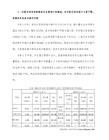
4. What does the man think of the book?
பைடு நூலகம்
A. uite difficult B. Very interesting C. Too simple
5. What are the speakers talking about?
A. Weather B. Clothes C. News
第二节(共15小题:每小题1.5分,满分22.5分)
听下面5段对话或对白,每段对话或对白后有几个小题,从题中所给的A、B、C三个选项中选出
A. £19.15 B.£9.18 C. £9.15
答案是C
1. What does the woman want to do?
A. Find a place B. Buy a map C. Get an address
2. What will the man do for the woman?
A. Repair her car B. Give her a ride C. Pick up her aunt
3. Who might Mr. Peterson be?
A. A new professor. B. A department head. C. A company director
的答案转涂到答题卡上。
第一节(共5个小题:每小题1.5分,满分7.5分)
听下面5段对话。每段对话后有一道小题,从每题所给的A B C三个选项中选出最佳选项,并标在试卷的相应位置。听完每段对话后,你都有10秒钟的时间来回答有关小题和阅读下一小题。每段对话仅读一遍。
例:How much is the shirt?
2014年高考英语真题(新课标全国卷Ⅱ)及答案详细解析
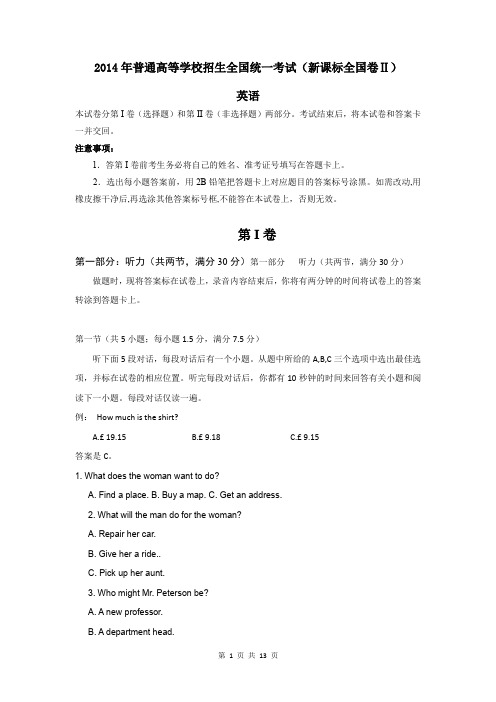
2014年普通高等学校招生全国统一考试(新课标全国卷Ⅱ)英语本试卷分第I卷(选择题)和第II卷(非选择题)两部分。
考试结束后,将本试卷和答案卡一并交回。
注意事项:1.答第I卷前考生务必将自己的姓名、准考证号填写在答题卡上。
2.选出每小题答案前,用2B铅笔把答题卡上对应题目的答案标号涂黑。
如需改动,用橡皮擦干净后,再选涂其他答案标号框,不能答在本试卷上,否则无效。
第I卷第一部分:听力(共两节,满分30分)第一部分听力(共两节,满分30分)做题时,现将答案标在试卷上,录音内容结束后,你将有两分钟的时间将试卷上的答案转涂到答题卡上。
第一节(共5小题;每小题1.5分,满分7.5分)听下面5段对话,每段对话后有一个小题。
从题中所给的A,B,C三个选项中选出最佳选项,并标在试卷的相应位置。
听完每段对话后,你都有10秒钟的时间来回答有关小题和阅读下一小题。
每段对话仅读一遍。
例:How much is the shirt?A.£ 19.15B.£ 9.18C.£ 9.15答案是C。
1. What does the woman want to do?A. Find a place.B. Buy a map.C. Get an address.2. What will the man do for the woman?A. Repair her car.B. Give her a ride..C. Pick up her aunt.3. Who might Mr. Peterson be?A. A new professor.B. A department head.C. A company director.4. What does the man think of the book?A. Quite difficult..B. Very interesting.C. Too simple.5. What are the speakers talking about?A. Weather.B. Clothes.C. News.第二节(共15小题;每小题1.5分,满分22.5分)听下面5段对话或独白。
2014高考英语全国卷1真题(完整版)
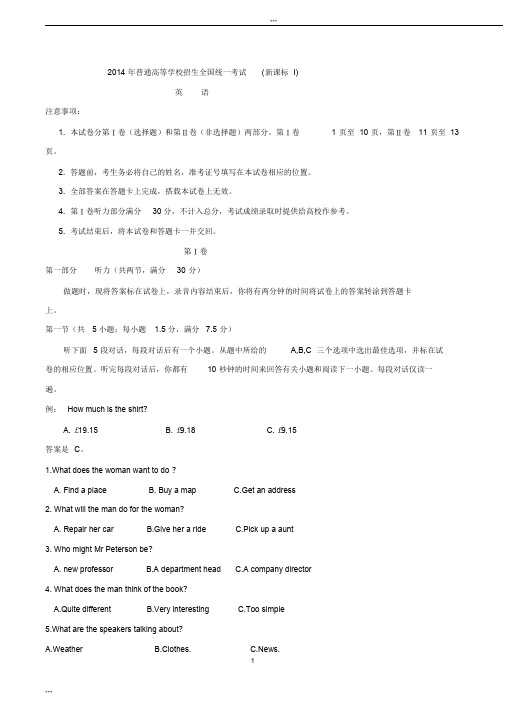
2014 年普通高等学校招生全国统一考试(新课标I)英语注意事项:1. 本试卷分第Ⅰ卷(选择题)和第Ⅱ卷(非选择题)两部分。
第Ⅰ卷 1 页至10 页,第Ⅱ卷11 页至13 页。
2. 答题前,考生务必将自己的姓名,准考证号填写在本试卷相应的位置。
3. 全部答案在答题卡上完成,搭载本试卷上无效。
4. 第Ⅰ卷听力部分满分30 分,不计入总分,考试成绩录取时提供给高校作参考。
5. 考试结束后,将本试卷和答题卡一并交回。
第Ⅰ卷第一部分听力(共两节,满分30 分)做题时,现将答案标在试卷上,录音内容结束后,你将有两分钟的时间将试卷上的答案转涂到答题卡上。
第一节(共 5 小题;每小题 1.5 分,满分7.5 分)听下面 5 段对话,每段对话后有一个小题。
从题中所给的A,B,C 三个选项中选出最佳选项,并标在试卷的相应位置。
听完每段对话后,你都有10 秒钟的时间来回答有关小题和阅读下一小题。
每段对话仅读一遍。
例:How much is the shirt?A. £19.15B. £9.18C. £9.15答案是C。
1.What does the woman want to do ?A. Find a placeB. Buy a mapC.Get an address2. What will the man do for the woman?A. Repair her carB.Give her a rideC.Pick up a aunt3. Who might Mr Peterson be?A. new professorB.A department headC.A company director4. What does the man think of the book?A.Quite differentB.Very interestingC.Too simple5.What are the speakers talking about?A.WeatherB.Clothes.C.News.第二节(共15 小题;每小题 1.5 分,满分22.5 分)听下面 5 段对话。
2014年全国统一高考英语试卷(大纲卷)(含解析)
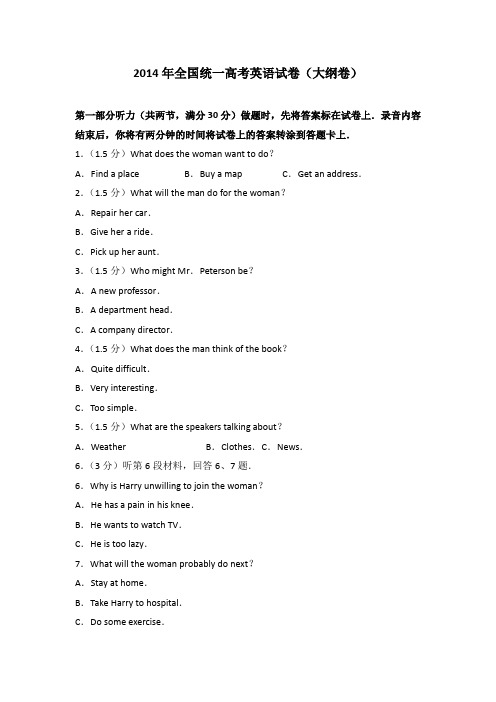
2014年全国统一高考英语试卷(大纲卷)第一部分听力(共两节,满分30分)做题时,先将答案标在试卷上.录音内容结束后,你将有两分钟的时间将试卷上的答案转涂到答题卡上.1.(1.5分)What does the woman want to do?A.Find a place B.Buy a map C.Get an address.2.(1.5分)What will the man do for the woman?A.Repair her car.B.Give her a ride.C.Pick up her aunt.3.(1.5分)Who might Mr.Peterson be?A.A new professor.B.A department head.C.A company director.4.(1.5分)What does the man think of the book?A.Quite difficult.B.Very interesting.C.Too simple.5.(1.5分)What are the speakers talking about?A.Weather B.Clothes.C.News.6.(3分)听第6段材料,回答6、7题.6.Why is Harry unwilling to join the woman?A.He has a pain in his knee.B.He wants to watch TV.C.He is too lazy.7.What will the woman probably do next?A.Stay at home.B.Take Harry to hospital.C.Do some exercise.8.(3分)听第7段材料,回答第8、9题.8.When will the man be home from work?A.At 5:45.B.At 6:15.C.At 6:50.9.Where will the speakers go?A.The Green House Cinema.B.The New State Cinema.C.The UME Cinema.10.(4.5分)听第8段材料,回答第10至12题.10.How will the speakers go to New York?A.By air.B.By taxi.C.By bus.11.Why are the speakers making the trip?A.For business.B.For shopping.C.For hoilday.12.What is the probable relationship between the speakers?A.Driver and passenger.B.Husband and wife.C.Fellow workers.13.(6分)听第9段材料,回答第13~16题.13.Where does this conversation probably take place?A.In a restaurant.B.In an office.C.In a classroom.14.What does John do now?A.He's a trainer.B.He's a tour guide.C.He's a college student.15.How much can a new person earn for the first year?A.10,500.B.12,000.C.15,000.16.How many people will the woman hire?A.Four.B.Three.C.Two.17.(6分)听第10段材料,回答第17至20题.17.How long has the speaker lived in a big city?A.One year B.Ten years C.Eighteen years.18.What is the speaker's opinion on public transport?A.It's comfortable B.It's time﹣saving C.It's cheap19.Whay is good about living in a small town?A.It's safer B.It's healthier C.It's more convenient 20.What kind of life does the speakers seem to like most?A.Busy B.Colourful C.Quiet.第二部分英语知识运用(共两节,满分45分)第一节单项填空(共15小题:每小题1分,满分15分)从A、B、C、D四个选项中.选出可以填入空白处的最佳选项,并在答题卡上将该项涂黑.21.(1分)﹣﹣﹣I'm sorry for breaking the cup.﹣﹣﹣Oh,____﹣﹣I've got plenty.()A.forget it B.my pleasureC.help yourself D.pardon me22.(1分)Unless extra money____,the theatre will close.()A.was found B.finds C.is found D.found23.(1分)Today there are more airplanes _____ more people than ever before in the skies.()A.carry B.carryingC.carried D.to be carrying24.(1分)Exactly ____ the potato was introduced into Europe is uncertain,but it was probably around 1565.()A.whether B.why C.when D.how25.(1分)﹣﹣﹣Who's that at the door?﹣﹣﹣_____ is the milkman.()A.He B.It C.This D.That26.(1分)_____ the nurses want a pay increase,they want reduced hours as well.()A.Not do only B.Do not only C.Only not do D.Not only do27.(1分)Raymond's parents wanted him to have ______ possible education.()A.good B.better C.best D.the best28.(1分)I think Mrs.Stark could be ______ between 50and 60years of age.()A.anywhere B.anybody C.anyhow D.anything29.(1分)September 30is the day ______ which you must pay your bill.()A.by B.for C.with D.in30.(1分)Although you _____ find bargains in London,it's not generally a cheap place to shop.()A.should B.need C.must D.can31.(1分)Caroline doesn't have a gift for music,but she _____ it with hard work.()A.goes back on B.takes away fromC.makes up for D.catches up with32.(1分)The reports went missing in 2012and nobody ______ them since.()A.sees B.saw C.has seen D.had seen33.(1分)_____ me tomorrow and I'll let you know the lab result.()A.Calling B.CallC.To call D.Having called34.(1分)Henry was away from home for quiet a bit and _____ saw his family.()A.frequently B.seldom C.always D.usually35.(1分)﹣﹣﹣What did you do last weekend?﹣﹣﹣Nothing _____.()A.much B.else C.ever D.yet第二节完形填空(共1小题满分30分)阅读下面短文.从短文后各题所给的四个选项(A、B.C和D)中,选出可以填入空白处的最佳选项,并在答题卡上将该项小涂黑.36.(30分)Joe Simpson and Simon Yates were the first people to climb the West Face of the Siula Grande in the Andes mountains.They reached the top (36),but on their way back conditions were very(37).Joe fell and broke his leg.They both knew that if Simon(38)alone,he would probably get back(39).But Simon decided to risk his (40)and try to lower Joe down the mountain on a rope(绳).As they (41)down,the weather got worse.Then another(42)occurred.They couldn't see or hear each other and,(43),Simon lowered his friend over the edge of a precipice(峭壁).It was(44)for Joe to climb back or for Simon to pull him up.Joe's(45)was pulling Simon slowly towards the precipice.(46),after more than an hour in the dark and the icy cold,Simon had to(47).In tears,he cut the rope.Joe(48)into a large crevasse (裂缝)in the ice below.He had no food or water and he was in terrible pain.He couldn't walk,but he(49)to get out of the crevasse and started to (50)towards their camp,nearly ten kilometers(51).Simon had(52)the camp at the foot of the mountain.He thought that Joe must be(53),but he didn't want to leave(54).Three days later,in the middle of the night,he heard Joe's voice.He couldn't(55)it.Joe was there,a few meters from their tent,still alive.36.A.hurriedly B.carefully C.successfully D.early 37.A.difficult B.similar C.special D.normal 38.A.climbed B.worked C.rested D.continued 39.A.unwillingly B.safely C.slowly D.regretfully 40.A.fortune B.time C.health D.life 41.A.lay B.settled C.went D.looked 42.A.damage B.storm C.change D.trouble 43.A.by mistake B.by chance C.by chance D.by luck 44.A.unnecessary B.practical C.important D.impossible 45.A.height B.weight C.strength D.equipment 46.A.Finally B.Patiently C.Surely D.Quickly 47.A.stand back B.take a rest C.make a decision D.hold on 48.A.jumped B.fell C.escaped D.backed 49.A.managed B.planned C.waited D.hoped 50.A.run B.skate C.move D.march 51.A.around B.away C.above D.along 52.A.headed for B.travelled C.left for D.returnedto 53.A.dead B.hurt C.weak D.late 54.A.secretly B.tiredly C.immediately D.anxiously55.A.find B.believe C.make D.accept.第三部分阅读理解(满分40分)阅读下列短文,从每题所给的四个选项(A,B,C和D)中,选出最佳选项.并在答且卡上将该项涂黑.56.(8分)Arriving in Sydney on his own from India,my husband,Rashid,stayed in a hotel for a short time while looking for a house for me and our children.During the first week of his stay,he went out one day to do some shopping.He came back in the late afternoon to discover that his suitcase was gone.He was extremely worried as the suitcase had all his important papers,including his passport(护照).He reported the case to the police and then sat there,lost and lonely in strange city,thinking of the terrible troubles of getting all the paperwork organized again from a distant country while trying to settle down in a new one.Late in the evening,the phone rang.It was a stranger.He was trying to pronounce my husband's name and was asking him a lot of questions.Then he said they had found a pile of papers in their trash can(垃圾桶)that had been left out on the footpath.My husband rushed to their home to find a kind family holding all his papers and documents(文件).Their young daughter had gone to the trash can and found a pile of unfamiliar papers.Her parents had carefully sorted them out,although they had found mainly foreign addresses on most of the documents.At last they had seen a half﹣written letter in the pile in which my husband had given his new telephone number to a friend.That family not only restored the important documents to us that day but also restored our faith and trust in people.We still remember their kindness and often send a warm wish their way.56.What did Rashid plan to do after his arrival in Sydney?A.Go shopping B.Find a houseC.Join his family D.Take a vacation57.The girl's parents got Rashid's phone number from.A.a friend of his family B.a Sydney policemanC.a letter in his papers D.a stranger in Sydney58.What does the underlined word"restored"in the last paragraph mean?A.Showed B.Gave backC.Delivered D.Sent out59.Which of the following can be the best title for the text?A.From India to Australia B.Living in a New Country.C.Turning Trash to Treasure D.In Search of New Friends.60.(8分)Since the first Earth Day in 1970,Americans have gotten a lot"greener"toward the environment(环境)."We didn't know at that time there even was an environment,let alone that there was a problem with it,"says Bruce Anderson,president of Earth Day USA.But what began as nothing important in public affairs has grown into a social movement.Business people,political leaders,university professors,and especially millions of grass﹣roots Americans are taking part in the movement."The understanding has increased many,many times,"says Gaylord Nelson,the former governor from Wisconsin,who thought up the first Earth Day.According to US government reports,emissions(排放)from cars and trucks have dropped from 10.3million tons a year to 5.5tons.The number of cities producing CO beyond the standard has been reduced from 40to 9.Although serious problems still remain and need to be dealt with,the world is a safer and healthier place.A kind of"Green thinking"has become part of practices.Great improvement has been achieved.In 1988there were only 600recycling(回收利用)programs;today in 1995there are about 6,600.Advanced lights,motors,and building designs have helped save a lot of energy and therefore prevented pollution.Twenty﹣five years ago,there were hardly any education programs for environment.Today,it's hard to find a public school,university,or law school thatdoes not have such a kind of program."Until we do that,nothing else will change!"say Bruce Anderson.60.According to Anderson,before 1970,Americans had little idea aboutA.the social movement B.recycling techniques C.environmental problems D.the importance of Earth Day 61.Where does the support for environmental protection mainly come from?A.The grass﹣roots level B.The business circle C.Government officials D.University professors62.What have\Americans achieved in environmental protection?A.They have cut car emissions to the lowestB.They have settled their environmental problemsC.They have lowered their CO levels in forty cities.D.They have reduced pollution through effective measures.63.What is especially important for environmental protection according to the last paragraph?A.Education B.PlanningC.Green living D.CO reduction.64.(8分)One of the latest trend(趋势)in American Childcare is Chinese au pairs.Au Pair in Stamford,for example,has got increasing numbers of request for Chinese au pairs from aero to around 4,000since 2004.And that's true all across the country."I thought it would be useful for him to learn Chinese at an early age"Joseph Stocke,the managing director of a company,says of his 2﹣year old son."I would at least like to give him the chance to use the language in the future,"After only six months of being cared by 25﹣year﹣old woman from China,the boy can already understand basic Chinese daily expressions,his dad says.Li Drake,a Chinese native raising two children in Minnesota with an American husband,had another reason for looking for an au pair from China.She didn't wanther children to miss out on their roots."Because I am Chinese,my husband and I wanted the children to keep exposed to(接触)the language and culture(文化)."she says."Staying with a native speaker is better for children than simply sitting in a classroom,"says Suzanne Flynn,a professor in language education of Children."But parents must understand that just one year with au pair is unlikely to produce wonders.Complete mastery demands continued learning until the age of 10or 12." The popularity of au pairs from China has been strengthened by the increasing numbers of American parents who want their children who want their children to learn Chinese.It is expected that American demand for au pairs will continue to rise in the next few years.64.What does that term"au pair"in the text mean?A.A mother raising her children on her ownB.A young foreign woman taking care of children.C.A professor in language education of childrenD.A child learning a foreign language at home65.Li Drake has her children study Chinese because she wants them.A.to live in China some day B.to speak the language at home C.to catch up wit other children D.to learn about the Chinese culture 66.How can children leam a foreign language best according to Flynn?A.From their parents B.By attcnding classes.C.From a native speaker D.By starting at an early age.67.What can we infer from the text?A.Learning Chinese is becoming popular In America,B.Educated woman do better in looking after childrenC.Chinese au pairs need to improve their English Skills.D.Children can learn a foreign language well in six months.68.(8分)Metro Pocket GuideMetrorail(地铁)Each passenger needs a farecard to enter and go out.Up to two children under ago five may travel free with a paying customer.Farecard machine are in every station,Bring small bills because there are no change machines in the station and farecard machine only provide up to 5inchange.Get one of unlimited Metrorail rides with a One Day Pass.Buy it from a farecard machine in Metro stations.Use it after 9:30 a.m.until closing on weekdays,and all day on weekends and holidays.Hours of ServiceOpen:5 a.m Mon﹣Fri 7a.m.Sat﹣Sun.Close:midnight Sun﹣Thur.3a.m.Fri﹣Sat.nightsLast train time vary.To avoid (避免)missing the last train,please check the last train time posted in the station.MetrobusWhen paying with exact change,the fare is 1.35.whenpayingwithasmatTripâCARDthefareis1.25Fares for the Senior/disabled customersSenior citizens 65 and older and disabled customers may ride for half the regular fare.On Metrorail and Metrobus,use a senior/disabled farecard or SmarTripâ card.For more information about buying senior/disabled farecards,or SmarTripâ cards and passes,please visit MetroOpenDoors.com or call 202﹣637﹣7000 and 202﹣637﹣8000.Senior citizens and disabled customers can get free guide on how to use proper Metrobus and Metrorail services by calling 202﹣962﹣1100Travel tips•Avoid riding during weekday rush periods﹣before 9:30 a.m.and between 4 and 6 p.m.•If you lose something on a bus or train or in a station,please call Lost Found at 202﹣962﹣1195.68.What should you know about farecard machines?A.They start selling tickets at 9:30 a.m.B.They are connected to change machines.C.They offer special service to the elderly.D.They make change for no more than $5.69.At what time does Metrorail stop service on Saturday?A.At midnight B.at 3 a.m C.at 5 a.m D.at 7 p.m.70.What is good about a SmarTrip®card?A.It is convenient for old people B.It saves money for its users C.it can be bought at any time D.it is sold on the Internet.71.Which number should you call if you lose something on the Metro?A.202﹣962﹣1195B.202﹣962﹣1100C.202﹣673﹣7000D.202﹣673﹣8000.72.(8分)Which boy hasn't dreamed of being a cool secret agent(特工)?The wonderful fighting and the world﹣saving adventures are much more colourful than most people's everyday lives.Well,Cody Banks is just like any other boy,except that he is not just dreaming.He has a big secret his friends never know about.He was trained to be a spy(间谍)by a special CIA programme,which was made to look like a summer camp.He learned high﹣speed driving,hand﹣to﹣hand fighting and the use of high﹣tech tools.After proving he could become a young hero by saving a baby from a runaway car,Banks gets his first real task.He must make friends with a popular girl at school,Natalie Connors.Then,he must spy on her father,a scientist who has developed a dangerous technology(技术).Banks must stop a group of bad people from forcing Natalie's father into using the technology to endanger the world.The CIA may have taught him first﹣class self﹣defence moves,but they didn't show him hoe to talk to girls.Banks has zero ability when it comes to dealing with girls.How can he get around his problem and get an invitation to the girl's upcoming birthday party?Will he finally become Natalie's boyfriend and find out whatever hecan about her father's work?Agent Cody Banks has everything that young people are interested in:big explosions,breath﹣taking performances and funny girl﹣dating experiences.It was listed in No.2in the American box office last week."This story is interesting and fun for the whole family to enjoy,and especially cool for young boys."said Paul Perkins,a film reviewer in the US.72.What is Bank's first real task?A.To test a high﹣tech tool B.To save a baby from a carC.To study a new technology D.To watch a scientist secretly 73.Banks wanted to go to Natalie's birthday party to.A.meet her father B.know more people C.make friends with her D.steal some information 74.What is considered as a great danger in the text?A.The technology developed by Natalie's fatherB.An explosion set off by some bad peopleC.The CIA's training of boys for its taskD.Secret agents spying on scientists75.What is the purpose of the text?A.Making known the work of the CIA B.Telling the story about a cool boy C.Showing the dark side of science D.Introducing a new film.第四部分写作(共两节.满分35分)第一节短文改错(共1小题;每小题10分,满分l0分)76.(10分)此题要求改正所给短文中的错误.对标有题号的每一行作出判断:如无错误.在该行右边横线上画一个勾(√):如有错误(每行只有一个错误),则按下列情况改正:此行多一个词:把多余的词用斜线(\)划掉.在该行右边横线上写出该词,并也用斜线划掉.此行缺一个词:在缺词处加一个插字符号(A),在该行右边横线上写出该加的词.此行错一个词:在错的词下划一横线,在该行右边横线上写出改正后的词.注意:原行没有错的不要改.All of us need friendship.The understandingbetween two friends mean both of them have similarideas and trusting each other.Otherwise,it isimpossible for him to help each other and to maketheir friendship to last long.As an old saying goes,"A friend in need is a friend indeed."So really friendshipshould able to stand all sorts of tests.And it iswise to have as many good friends that we can.The more friends we have,the more we can learn forone another,but the more pleasure we can share together.76.77.78.79.80.81.82.83.84.85..第二节书面表达(满分25分)86.(25分)一家英语报社向中学生征文,主题是"十年后的我"、请根据下列要求和你的想象完成短文(1)家庭(2)工作(3)业余生活注意:(1)字数100左右;(2)可以适当增加细节,以使行文连贯;(3)开头语已为你写好I often imagine what my life will be like in the future..2014年全国统一高考英语试卷(大纲卷)参考答案与试题解析第一部分听力(共两节,满分30分)做题时,先将答案标在试卷上.录音内容结束后,你将有两分钟的时间将试卷上的答案转涂到答题卡上.1.(1.5分)(2014•安徽)What does the woman want to do?A.Find a place B.Buy a map C.Get an address.【分析】略【解答】A2.(1.5分)(2014•安徽)What will the man do for the woman?A.Repair her car.B.Give her a ride.C.Pick up her aunt.【分析】略【解答】B3.(1.5分)(2014•安徽)Who might Mr.Peterson be?A.A new professor.B.A department head.C.A company director.【分析】略【解答】C4.(1.5分)(2014•安徽)What does the man think of the book?A.Quite difficult.B.Very interesting.C.Too simple.【解答】B5.(1.5分)(2014•安徽)What are the speakers talking about?A.Weather B.Clothes.C.News.【分析】略【解答】A6.(3分)(2014•安徽)听第6段材料,回答6、7题.6.Why is Harry unwilling to join the woman?A.He has a pain in his knee.B.He wants to watch TV.C.He is too lazy.7.What will the woman probably do next?A.Stay at home.B.Take Harry to hospital.C.Do some exercise.【分析】略【解答】B C8.(3分)(2014•安徽)听第7段材料,回答第8、9题.8.When will the man be home from work?A.At 5:45.B.At 6:15.C.At 6:50.9.Where will the speakers go?A.The Green House Cinema.B.The New State Cinema.C.The UME Cinema.【解答】AC10.(4.5分)(2014•安徽)听第8段材料,回答第10至12题.10.How will the speakers go to New York?A.By air.B.By taxi.C.By bus.11.Why are the speakers making the trip?A.For business.B.For shopping.C.For hoilday.12.What is the probable relationship between the speakers?A.Driver and passenger.B.Husband and wife.C.Fellow workers.【分析】略【解答】AAC13.(6分)(2014•安徽)听第9段材料,回答第13~16题.13.Where does this conversation probably take place?A.In a restaurant.B.In an office.C.In a classroom.14.What does John do now?A.He's a trainer.B.He's a tour guide.C.He's a college student.15.How much can a new person earn for the first year?A.10,500.B.12,000.C.15,000.16.How many people will the woman hire?A.Four.B.Three.C.Two.【分析】略【解答】BCAC17.(6分)(2014•大纲卷)听第10段材料,回答第17至20题.17.How long has the speaker lived in a big city?A.One year B.Ten years C.Eighteen years.18.What is the speaker's opinion on public transport?A.It's comfortable B.It's time﹣saving C.It's cheap19.Whay is good about living in a small town?A.It's safer B.It's healthier C.It's more convenient 20.What kind of life does the speakers seem to like most?A.Busy B.Colourful C.Quiet.【分析】略【解答】BCAB第二部分英语知识运用(共两节,满分45分)第一节单项填空(共15小题:每小题1分,满分15分)从A、B、C、D四个选项中.选出可以填入空白处的最佳选项,并在答题卡上将该项涂黑.21.(1分)(2014•大纲卷)﹣﹣﹣I'm sorry for breaking the cup.﹣﹣﹣Oh,____﹣﹣I've got plenty.()A.forget it B.my pleasureC.help yourself D.pardon me【分析】句意:﹣﹣对不起,打坏了你的杯子.﹣﹣噢,没关系.我还有很多呢.【解答】答案A.B项"不用谢";C项"你请自便";D项"对不起,请再说一遍";A项"不客气;没关系;算了;别提它了"通常用于1.回答感谢.2.回答道歉.3.表示某情况无关紧要.4.不想重复说过的话.根据句意"对不起,打坏了你的杯子"可知,说话者是回应别人道歉的,因此A项符合语境,故选A.22.(1分)(2014•大纲卷)Unless extra money____,the theatre will close.()A.was found B.finds C.is found D.found【分析】句意为:除非能筹到更多的钱,不然剧院就会关闭.【解答】答案:C 本题考查时态语态,其结构是be+动词的过去分词,从句中用钱做主语,但钱需要人去找,因此钱是被(人)找,所以采用被动语态,主句是一般将来时,所以条件状语从句中应该用一般现在时态,所以本题选择C.23.(1分)(2014•大纲卷)Today there are more airplanes _____ more people than ever before in the skies.()A.carry B.carryingC.carried D.to be carrying【分析】句意为:现如今,在空中有比以前更多的飞机运送乘客.【解答】答案:B 考查现在分词作定语.句中是there be 句型,空格处是非谓语,作定语修饰前面的airplanes,此处airplane和carry之间是主动关系,故用现在分词作定语.故选B.24.(1分)(2014•大纲卷)Exactly ____ the potato was introduced into Europe is uncertain,but it was probably around 1565.()A.whether B.why C.when D.how【分析】句意:准确的说,土豆是什么时候被传到欧洲的还不确定,但是可能在1565年左右.【解答】答案C.分析句子结构可知,but前后是两个句子,第一个句子中"is uncertain"是句子的谓语,"Exactly ____ the potato was introduced into Europe"是的主语,因此这里是主语从句.根据句子的意思"准确的说,土豆是什么时候被传到欧洲的还不确定"可知,需要用连接词"when"来引导主语从句.其它选项均不符合,故选C.25.(1分)(2014•大纲卷)﹣﹣﹣Who's that at the door?﹣﹣﹣_____ is the milkman.()A.He B.It C.This D.That【分析】句意:﹣门口的那个人是谁?﹣﹣是送牛奶的人.【解答】答案B.这是固定用法,一般不确定那人是男是女就应it指代.根据句意:答句里的主语(it)是表示问句的that.而在问的人的视角来说,他并不知道门那里的人到底是男是女.所以只能用it.但是一旦性别明确,就一定要用对应的he/she.26.(1分)(2014•大纲卷)_____ the nurses want a pay increase,they want reduced hours as well.()A.Not do only B.Do not only C.Only not do D.Not only do【分析】句意:护士们不仅想涨工资,而且还想减少工作时间.【解答】答案:D.根据句意"护士们不仅想涨工资,而且还想减少工作时间."以及句子中"as well"可知,这两个要求是并列关系,不仅…而且…,即not only…but also…,此处后面的but also被省略的了,在这个结构中,not only引导的句子置于句首时,句子须部分倒装,根据时态和主语,此处须借助助动词do,故前面的句子应该是"not only do the nurses want a pay increase",所以D正确.27.(1分)(2014•大纲卷)Raymond's parents wanted him to have ______ possible education.()A.good B.better C.best D.the best【分析】句意为:Raymond的父母想让他尽可能的接受最好的教育.【解答】答案:D,如果是"更好的教育",需在better前面加不定冠词,表示泛指一种更好的教育,a better possible education,B选项无不定冠词.根据常理,可推知,是希望他接受最好的教育,因此答案为D.28.(1分)(2014•大纲卷)I think Mrs.Stark could be ______ between 50and 60years of age.()A.anywhere B.anybody C.anyhow D.anything【分析】句意:我认为Stark夫人的岁数可能在50到60岁之间.【解答】答案A.anywhere任何地方;anybody任何人;anyhow无论如何,不管怎样;anything任何事.anywhere可以用来指代抽象的时间概念.where这个词可以指代抽象的东西,有抽象的地点、时间或条件的意义,anywhere也有时间意义.根据句意:我认为Stark夫人的岁数可能在50到60岁之间.故选A.29.(1分)(2014•大纲卷)September 30is the day ______ which you must pay your bill.()A.by B.for C.with D.in【分析】句意:9月30日是你必须付账单的最后期限.【解答】答案:A by"截止到…日期";根据句意:______ which you must pay your bill是定语从句休息the day,这一天是你付账的"截止期限"故用by,选A.30.(1分)(2014•大纲卷)Although you _____ find bargains in London,it's not generally a cheap place to shop.()A.should B.need C.must D.can【分析】句意:尽管你能在伦敦找到便宜货,但是一般不是购物便宜的地方.【解答】答案:D should"应该";need"需要";must"必须,肯定,偏偏";can"能够,有时会".根据句意:although连接让步状语从句,尽管你"能够"在伦敦找到便宜货,但是一般不是购物便宜的地方.故选D.31.(1分)(2014•大纲卷)Caroline doesn't have a gift for music,but she _____ itwith hard work.()A.goes back on B.takes away fromC.makes up for D.catches up with【分析】句意为:Caroline没有音乐天赋,但她用努力学习弥补了她的不足.【解答】答案:C 考查动词短语的用法.Caroline没有音乐天赋,但她用努力学习弥补了她的不足.此处make up for意为:弥补.根据句意选C.goes back on 违背;takes away from 从…拿走;catches up with赶上.32.(1分)(2014•大纲卷)The reports went missing in 2012and nobody ______ them since.()A.sees B.saw C.has seen D.had seen【分析】那些报告于2012年丢失了,从那以后没有人再见过它们.【解答】答案C.本题主要考查动词时态.句意强调过去报告的丢失对现在的影响和结果就是再也没人看到过那些报告,故用现在完成时.此题解题的关键词是后面的since,此处意为:从那以后.这是现在完成时的标志.故选C.33.(1分)(2014•大纲卷)_____ me tomorrow and I'll let you know the lab result.()A.Calling B.CallC.To call D.Having called【分析】句意为:明天给我打电话,我就告诉你实验结果.【解答】答案:B 本题考查"祈使句+连词+陈述句"这个固定句式,在这个结构中,连词通常由and充当,表示顺接,or表示逆接.and I'll﹣﹣﹣是审题的关键,由此判断前面是祈使句.所以选择B.34.(1分)(2014•大纲卷)Henry was away from home for quiet a bit and _____ saw his family.()A.frequently B.seldom C.always D.usually【分析】句意为:Harry已经离开家有一段时间了,他很少看见他的家人.【解答】答案:B frequently频繁地,经常地;seldom很少;always总是,一直;usually通常.根据句义可知他已经离开家了,那么很少有和家人见面的机会.故使用副词seldom表示否定.故B正确.35.(1分)(2014•大纲卷)﹣﹣﹣What did you do last weekend?﹣﹣﹣Nothing _____.()A.much B.else C.ever D.yet【分析】句意为:﹣﹣上周末你做了什么?﹣﹣没什么重要的事.【解答】答案:A,nothing (什么也)没有,没有什么东西(什么事),是不定代词,much,adj.(比较级、最高级more;most),用于修饰不可数名词或不定代词.nothing else没有别的;没有别的东西;nothing ever,nothing yet 搭配不当,不符句意.所以本题选择A.第二节完形填空(共1小题满分30分)阅读下面短文.从短文后各题所给的四个选项(A、B.C和D)中,选出可以填入空白处的最佳选项,并在答题卡上将该项小涂黑.36.(30分)(2014•大纲卷)Joe Simpson and Simon Yates were the first people to climb the West Face of the Siula Grande in the Andes mountains.They reached the top (36)successfully,but on their way back conditions were very(37)difficult.Joe fell and broke his leg.They both knew that if Simon(38)continued alone,he would probably get back(39)safely.But Simon decided to risk his (40)life and try to lower Joe down the mountain on a rope(绳).As they (41)went down,the weather got worse.Then another(42)trouble occurred.They couldn't see or hear each other and,(43)by mistake,Simon lowered his friend over the edge of a precipice(峭壁).It was(44)impossible for Joe to climb back or for Simon to pull him up.Joe's(45)weight was pulling Simon slowly towards the precipice.(46)Finally,after more than an hour in the dark and the icy cold,Simon had to(47)make a decision.In tears,he cut therope.Joe(48)fell into a large crevasse(裂缝)in the ice below.He had no food or water and he was in terrible pain.He couldn't walk,but he(49)hoped to get out of the crevasse and started to (50)move towards their camp,nearly ten kilometers(51)away.Simon had(52)returned to the camp at the foot of the mountain.He thought that Joe must be(53)dead,but he didn't want to leave(54)immediately.Three days later,in the middle of the night,he heard Joe's voice.He couldn't(55)believe it.Joe was there,a few meters from their tent,still alive.36.A.hurriedly B.carefully C.successfully D.early 37.A.difficult B.similar C.special D.normal 38.A.climbed B.worked C.rested D.continued 39.A.unwillingly B.safely C.slowly D.regretfully 40.A.fortune B.time C.health D.life 41.A.lay B.settled C.went D.looked 42.A.damage B.storm C.change D.trouble 43.A.by mistake B.by chance C.by chance D.by luck 44.A.unnecessary B.practical C.important D.impossible 45.A.height B.weight C.strength D.equipment 46.A.Finally B.Patiently C.Surely D.Quickly 47.A.stand back B.take a rest C.make a decision D.hold on 48.A.jumped B.fell C.escaped D.backed 49.A.managed B.planned C.waited D.hoped 50.A.run B.skate C.move D.march 51.A.around B.away C.above D.along。
2014年高考真题全国大纲英语试卷(高清+视频讲解)

$"
#
!"
!#$%#&' $%
# & !'& ('&
')*+,-./ 012/31/042
"'6 !7'!&'#####8'6 7'!9'#####:'6 7'!&'
()* :
!';/<2=*312/3+*,<> +<>22*=*
:'A3E2E*4
W'432-4>3= 2*
:'L312
W'2/3L312
*..-443='P/3B.*-A=>^2133*4/3<43<./ *2/34<>= #M$# V0,*> A*+343= &$'"'=3<=
8'/-42
:'+3<I
W'A<23
D9'\2/0>I K41'V2<4I .*-A= L3
:')3012**A<TB'
(';/<2+0AA2/3+*,<> @4*L<LAB=*>3U2
"'V2<B<2/*,3'
8'P<I3)<44B2*/*1@02<A'
:'W*1*,33U34.013'
+, ( -./0(, 97 1
2014年高考英语试题及答案全国卷

2014年普通高等学校招生全国统一考试新课标II卷英语本试卷分第I卷(选择题)和第II卷(非选择题)两部分。
考试结束后,将本试卷和答案卡一并交回。
注意事项:1.答第I卷前考生务必将自己的姓名、准考证号填写在答题卡上。
2.选出每小题答案前,用2B铅笔把答题卡上对应题目的答案标号涂黑。
如需改动,用橡皮擦干净后,再选涂其他答案标号框,不能答在本试卷上,否则无效。
第一部分阅读理解(共两节,满分40分)第一节(共15小题;每小题2分,满分40分)阅读下列短文,从每题所给的四个选项(A、B、C和D)中,选出最佳选项。
并在答题卡上将该选项涂黑.AArriving in Sydney on his own from India, my husband, Rashid, stayed in a hotel for a short time while looking for a house for me and our children.During the first week of his stay, he went out one day to do some shopping. He came back in the late afternoon to discover that his suitcase was gone. He was extremely worried as the suitcase had all his important papers, including his passport.He reported the case to the police and then sat there,lost and lonely in a strange city, thinking of the terrible troubles of getting all the paperwork organised again from a distant country while trying to settle down in a new one.Late in the evening, the phone rang. It was a stranger. He was trying to pronounce my husband’s name and was asking him a lot of questions. Then he said they had found a pile of papers in their trash can(垃圾桶)that had been left out on the footpath.My husband rushed to their home to find a kind family holding all his papers and documents. Their young daughter had gone to the trash can and found a pile of unfamiliar papers. Her parents had carefully sorted them out, although they had found mainly foreign addresses on most of the documents. At last they had seen a half-written letter in the pile in which my husband had given his new telephone number to a friend.That family not only restored the important documents to us that day but also restored our faith and trust in people. We still remember their kindness and often send a warm wish their way.1. What did Rashid plan to do after his arrival in Sydney?A. Go shoppingB. Find a houseC. Join his familyD. Take his family2. The girl’s parents got Rashid’s phone number from_______.A. a friend of his familyB. a Sydney policemanC. a letter in his papersD. a stranger in Sydney3. What does the underlined word “restored” in the last paragraph mean?A. ShowedB. Sent outC. DeliveredD. Gave back4. Which of the following can be the best title for the text?A. From India to Australia.B. Living in a New Country.C. Turning Trash to Treasure.D. In Search of New Friends.BSince the first Earth Day in 1970,American have gotten a lot “greener” toward the environment . “We didn’t know at that time there even was an environment, let alone that there was a problem with it,” says Bruce Anderson, president of Earth Day USA.But what began as nothing important in public affairs has grown into a social movement .Business people, political leaders, university professors, and especially millions of grass-roots Americans are taking part in the movement. “The understanding has increased many ,many times,” says Gaylord Nelson, the former governor from Wisconsin, who thought up the first Earth Day.According to US government reports , emissions (排放)from cars and trucks have dropped from 10.3 million tons a year to 5.5 million tons .The number of cities producing CO beyond the standard has been reduced from 40 to 9 .Although serious problems still remain and need to be dealt with , the world is a safer and healthier place .A kind of “Green thinking ” has become part of practices .Great improvement has been achieved .In 1988 there were only 600 recycling programs ,; today in 1995 there are about 6,600 .Advanced lights ,motors , and building designs have helped save a lot of energy and therefore prevented pollution .Twenty –five years ago , there were hardly any education programs for environment .Today , it’s hard to find a public school , university , or law school that does not have such a kind of program . “Until we do that , nothing else will change! ” say Bruce Anderson .5 According to Anderson , before 1970, Americans had little idea about ___A. the social movementB. recycling techniquesC. environmental problemsD. the importance of Earth Day6 Where does the support for environmental protection mainly come from?A. The grass –roots levelB. The business circleC. Government officialsD. University professors7. What have Americans achieved in environmental protection ?A. They have cut car emissions to the lowestB. They have settled their environmental problemsC. They have lowered their CO levels in forty cities.D. They have reduced pollution through effective measures .8. What is especially important for environmental protection according to the last paragraph ?A. EducationB. PlanningC. Green livingD. CO reductionCOne of the latest trend(趋势)in American Childcare is Chinese au pairs. Au Pair in Stamford , Conn, for example, has got increasing numbers of request for Chinese au pairs from zero to around 4,000 since 2004. And that’s true all across the country.“I thought it would be very useful for him to learn Chinese at an early age” Joseph Stock, the managing director of a company, says of his 2-year old son. “I would at least like to give him the chance to use the language in the future,” After only six months of being cared by 25-year-old woman from China, the boy can already understand basic Chinese daily expressions, his dad says. Li Drake, a Chinese native raising two children in Minnesota with an American husband, had another reason for looking for an au pair from China. She didn’t want her children to miss out ontheir roots.” Because I am Chinese, my husband and I wanted the children to keep exposed to(接触) the language and culture.” she says.“Staying with a native speaker is better for children than simply sitting in a classroom,” says Suzanne Flynn, a professor in language education of Children.” But parents must understand that just one year with au pair is unlikely to produce wonders. Complete mastery demands continued learning until the age of 10 or 12.”The popularity o au pairs from china has been strengthened by the increasing numbers of American parents who want their children to learn Chinese. It is expected that American demand for au pairs will continue to rise in the next few years.9.What does that term” au pair” in the text mean?A. A mother raising her children on her ownB. A child learning a foreign language at homeC. A professor in language education of childrenD. A young foreign woman taking care of children.10. Li Drake has her children study Chinese because she wants them ______.A. to live in China some dayB. to speak the language at homeC. to catch up wit other childrenD. to learn about the Chinese culture11. What can we infer from the text?A. Learning Chinese is becoming popular in America.B. Educated woman do better in looking after childrenC. Chinese au pairs need to improve their English Skills.D. Children can learn a foreign language well in six months.DMetro Pocket GuideMetrorail(地铁)Each passenger needs a farecard to enter and go out. Up to two children under age five may travel free with a paying customer.Farecard machine are in every station. Bring small bills because there are no change machines in the station and farecard machine only provide up to $ 5 in change.Get one of unlimited Metrorail rides with a One Day Pass. Buy it from a farecard machine in Metro stations. Use it after 9:30 a.m. until closing on weekdays, and all day on weekends and holidays.Hours of ServiceOpen: 5 a.m Mon,—Fri, 7a.m. Sat,—Sun .Close midnight Sun,—Thur. 3 a.m. Fri,—Sat. nightsLast train time vary. To avoid missing the last train, please check the last train time posted in the station.MetrobusWhen paying with exact change, the fare is $ 1.35 . when paying with a SmatTrip® card the fare is $1.25Fares for the Senior /disabled customersSenior citizens 65 and older and disabled customers may ride for half the regular fare. On Metrorail and Metrobus, use a senior/disabled farecard or SmarTrip® card. For more informationabout buying senior/disabled farecards, SmarTrip® card and passes, please visit or call 202-637-7000 and 202-637-8000.Senior citizens and disabled customers can get free guide on how to use proper Metrobus and Metrorail services by calling 202-962-1100Travel tips(提示). Avoid riding during weekday rush periods –before 9:30 a.m. and between 4 and 6 p.m.. If you lose something on a bus or train or in a station, please call Lost & Found at202-962-1195.12. what should you know about farecard machine?A. They start selling tickets at 9:30 a.m.B. They are connected to change machines.C. They offer special service to the elderly.D. They make change for no more than $5.13. At what time does Metrorail stop service on Saturday?A. At midnightB. at 3 a.m.C. at 5 amD. at 7 p.m.14. What is good about a SmarTrip® card?A. It is convenient for old peopleB. It saves money for its usersC. it can be bought at any timeD. it is sold on the Internet.15. Which number should you call if you lose something on the Metro?A. 202-962-1195B.202-962-1100C.202-673-7000D.202-673-8000第二节(共5小题;每小题2分,满分10分)根据短文内容,从短文后的选项中选出能填入空白处的最佳选项。
2014年高考英语全国卷1及答案
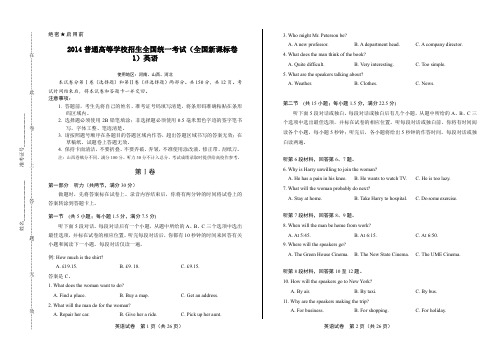
绝密★启用前2014普通高等学校招生全国统一考试(全国新课标卷1)英语使用地区:河南、山西、河北本试卷分第Ⅰ卷(选择题)和第Ⅱ卷(非选择题)两部分。
共150分,共12页。
考试时间结束后,将本试卷和答题卡一并交回。
注意事项:1. 答题前,考生先将自己的姓名、准考证号码填写清楚,将条形码准确粘贴在条形码区域内。
2. 选择题必须使用2B 铅笔填涂;非选择题必须使用0.5毫米黑色字迹的签字笔书写,字体工整、笔迹清楚。
3. 请按照题号顺序在各题目的答题区域内作答,超出答题区域书写的答案无效;在草稿纸、试题卷上答题无效。
4. 保持卡面清洁,不要折叠、不要弄破、弄皱,不准使用涂改液、修正带、刮纸刀。
注:山西卷赋分不同,满分180分。
听力30分不计入总分,考试成绩录取时提供给高校作参考。
第Ⅰ卷第一部分 听力(共两节,满分30分)做题时,先将答案标在试卷上。
录音内容结束后,你将有两分钟的时间将试卷上的答案转涂到答题卡上。
第一节 (共5小题;每小题1.5分,满分7.5分)听下面5段对话。
每段对话后有一个小题,从题中所给的A 、B 、C 三个选项中选出最佳选项,并标在试卷的相应位置。
听完每段对话后,你都有10秒钟的时间来回答有关小题和阅读下一小题。
每段对话仅读一遍。
例: How much is the shirt? A. £19.15.B. £9. 18.C. £9.15.答案是C 。
1. What does the woman want to do? A. Find a place.B. Buy a map.C. Get an address.2. What will the man do for the woman? A. Repair her car.B. Give her a ride.C. Pick up her aunt.3. Who might Mr. Peterson be? A. A new professor.B. A department head.C. A company director.4. What does the man think of the book? A. Quite difficult.B. Very interesting.C. Too simple.5. What are the speakers talking about? A. Weather.B. Clothes.C. News.第二节 (共15小题;每小题1.5分,满分22.5分)听下面5段对话或独白。
2014年高考英语试卷(大纲版)

2014年普通高等学校招生全国统一考试(大纲卷)第二部分 英语知识运用☎共两节,满分 分✆第一节 单项填空☎共 小题 每小题 分,满分 分✆ ✋❼❍ ♦☐❒❒⍓ ♐☐❒ ♌❒♏♋♓⏹♑ ♦♒♏ ♍◆☐ ♒ ♉♉♉♉ ✋❼❖♏ ♑☐♦ ☐●♏⏹♦⍓✌ ♐☐❒♑♏♦ ♓♦ ❍⍓ ☐●♏♋♦◆❒♏ ♒♏●☐ ⍓☐◆❒♦♏●♐ ☐♋❒♎☐⏹ ❍♏ ✞⏹●♏♦♦ ♏⌧♦❒♋ ❍☐⏹♏⍓♉♉♉♉ ♦♒♏ ♦♒♏♋♦❒♏ ♦♓●● ♍●☐♦♏✌ ♦♋♦ ♐☐◆⏹♎ ♐♓⏹♎♦ ♓♦ ♐☐◆⏹♎ ♐☐◆⏹♎ ❆☐♋♎⍓ ♦♒♏❒♏ ♋❒♏ ❍☐❒♏ ♋♓❒☐●♋⏹♏♦ ♉♉♉♉♉ ❍☐❒♏ ☐♏☐☐●♏ ♦♒♋⏹ ♏❖♏❒ ♌♏♐☐❒♏ ♓⏹ ♦♒♏ ♦♓♏♦✌ ♍♋❒❒⍓ ♍♋❒❒⍓♓⏹♑ ♍♋❒❒♓♏♎ ♦☐ ♌♏ ♍♋❒❒⍓♓⏹♑ ☜⌧♋♍♦●⍓ ♉♉♉♉ ♦♒♏ ☐☐♦♋♦☐ ♦♋♦ ♓⏹♦❒☐♎◆♍♏♎ ♓⏹♦☐ ☜◆❒☐☐♏ ♓♦ ◆⏹♍♏❒♦♋♓⏹ ♌◆♦ ♓♦ ♦♋♦ ☐❒☐♌♋♌●⍓ ♋❒☐◆⏹♎ ✌ ♦♒♏♦♒♏❒ ♦♒⍓ ♦♒♏⏹ ♒☐♦ ♒☐❼♦ ♦♒♋♦ ♋♦ ♦♒♏ ♎☐☐❒✍ ♉♉♉♉♉ ♓♦ ♦♒♏ ❍♓●❍♋⏹✌ ☟♏ ✋♦ ❆♒♓♦ ❆♒♋♦ ♉♉♉♉♉ ♦♒♏ ⏹◆❒♦♏♦ ♦♋⏹♦ ♋ ☐♋⍓ ♓⏹♍❒♏♋♦♏ ♦♒♏⍓ ♦♋⏹♦ ❒♏♎◆♍♏♎ ♒☐◆❒♦ ♋♦ ♦♏●●✌ ☠☐♦ ♎☐ ☐⏹●⍓ ☐ ⏹☐♦ ☐⏹●⍓ ⏹●⍓ ⏹☐♦ ♎☐ ☠☐♦ ☐⏹●⍓ ♎☐ ♋⍓❍☐⏹♎❼♦ ☐♋❒♏⏹♦♦ ♦♋⏹♦♏♎ ♒♓❍ ♦☐ ♒♋❖♏ ♉♉♉♉♉♉ ☐☐♦♦♓♌●♏ ♏♎◆♍♋♦♓☐⏹✌ ♑☐☐♎ ♌♏♦♦♏❒ ♌♏♦♦ ♦♒♏ ♌♏♦♦ ✋ ♦♒♓⏹ ❒♦ ♦♋❒ ♍☐◆●♎ ♌♏ ♉♉♉♉♉♉ ♌♏♦♦♏♏⏹ ♋⏹♎ ⍓♏♋❒♦ ☐♐ ♋♑♏✌ ♋⏹⍓♦♒♏❒♏ ♋⏹⍓♌☐♎⍓ ♋⏹⍓♒☐♦ ♋⏹⍓♦♒♓⏹♑ ♏☐♦♏❍♌♏❒ ♓♦ ♦♒♏ ♎♋⍓ ♉♉♉♉♉♉ ♦♒♓♍♒ ⍓☐◆ ❍◆♦♦ ☐♋⍓ ⍓☐◆❒ ♌♓●●✌ ♌⍓ ♐☐❒ ♦♓♦♒ ♓⏹ ✌●♦♒☐◆♑♒ ⍓☐◆ ♉♉♉♉♉ ♐♓⏹♎ ♌♋❒♑♋♓⏹♦ ♓⏹ ☹☐⏹♎☐⏹ ♓♦❼♦ ⏹☐♦ ♑♏⏹♏❒♋●●⍓ ♋ ♍♒♏♋☐ ☐●♋♍♏ ♦☐ ♦♒☐☐✌ ♦♒☐◆●♎ ⏹♏♏♎ ❍◆♦♦ ♍♋⏹ ♋❒☐●♓⏹♏ ♎☐♏♦⏹❼♦ ♒♋❖♏ ♋ ♑♓♐♦ ♐☐❒ ❍◆♦♓♍ ♌◆♦ ♦♒♏ ♉♉♉♉♉ ♓♦ ♦♓♦♒ ♒♋❒♎ ♦☐❒✌ ♑☐♏♦ ♌♋♍ ☐⏹ ♦♋♏♦ ♋♦♋⍓ ♐❒☐❍ ❍♋♏♦ ◆☐ ♐☐❒ ♍♋♦♍♒♏♦ ◆☐ ♦♓♦♒ ❆♒♏ ❒♏☐☐❒♦♦ ♦♏⏹♦ ❍♓♦♦♓⏹♑ ♓⏹ ♋⏹♎ ⏹☐♌☐♎⍓ ♉♉♉♉♉♉ ♦♒♏❍ ♦♓⏹♍♏✌ ♦♏♏♦ ♦♋♦ ♒♋♦ ♦♏♏⏹ ♒♋♎ ♦♏♏⏹ ♉♉♉♉♉ ❍♏ ♦☐❍☐❒❒☐♦ ♋⏹♎ ✋❼●● ●♏♦ ⍓☐◆ ⏹☐♦ ♦♒♏ ●♋♌ ❒♏♦◆●♦✌ ♋●●♓⏹♑ ♋●● ❆☐ ♍♋●● ☟♋❖♓⏹♑ ♍♋●●♏♎ ☟♏⏹❒⍓ ♦♋♦ ♋♦♋⍓ ♐❒☐❍ ♒☐❍♏ ♐☐❒ ❑◆♓♦♏ ♋ ♌♓♦ ♋⏹♎ ♉♉♉♉♉ ♦♋♦ ♒♓♦ ♐♋❍♓●⍓✌ ♐❒♏❑◆♏⏹♦●⍓ ♦♏●♎☐❍ ♋●♦♋⍓♦ ◆♦◆♋●●⍓ ♒♋♦ ♎♓♎ ⍓☐◆ ♎☐ ●♋♦♦ ♦♏♏♏⏹♎✍ ☠☐♦♒♓⏹♑ ♉♉♉♉♉✌ ❍◆♍♒ ♏●♦♏ ♏❖♏❒ ⍓♏♦第二节 完形填空☎共 小题;每小题 分,满分 分✆☺☐♏ ♓❍☐♦☐⏹ ♋⏹♎ ♓❍☐⏹ ✡♋♦♏♦ ♦♏❒♏ ♦♒♏ ♐♓❒♦♦ ☐♏☐☐●♏ ♦☐ ♍●♓❍♌ ♦♒♏ ♏♦♦ ☞♋♍♏ ☐♐ ♦♒♏ ♓◆●♋ ☝❒♋⏹♎♏ ♓⏹ ♦♒♏ ✌⏹♎♏♦ ❍☐◆⏹♦♋♓⏹♦ ❆♒♏⍓ ❒♏♋♍♒♏♎ ♦♒♏ ♦☐☐ ♉♉♉ ♌◆♦ ☐⏹ ♦♒♏♓❒ ♦♋⍓ ♌♋♍ ♍☐⏹♎♓♦♓☐⏹♦ ♦♏❒♏ ❖♏❒⍓ ♉♉♉ ☺☐♏ ♐♏●● ♋⏹♎ ♌❒☐♏ ♒♓♦ ●♏♑ ❆♒♏⍓ ♌☐♦♒ ⏹♏♦ ♦♒♋♦ ♓♐ ♓❍☐⏹ ♉♉♉♉ ♋●☐⏹♏ ♒♏ ♦☐◆●♎ ☐❒☐♌♋♌●⍓ ♑♏♦ ♌♋♍ ♉♉ ◆♦ ♓❍☐⏹ ♎♏♍♓♎♏♎ ♦☐ ❒♓♦ ♒♓♦ ♉♉♉♉ ♋⏹♎ ♦❒⍓ ♦☐ ●☐♦♏❒ ☺☐♏ ♎☐♦⏹ ♦♒♏ ❍☐◆⏹♦♋♓⏹ ☐⏹ ♋ ❒☐☐♏(绳)✌♦ ♦♒♏⍓ ♉♉♉ ♎☐♦⏹ ♦♒♏ ♦♏♋♦♒♏❒ ♑☐♦ ♦☐❒♦♏ ❆♒♏⏹ ♋⏹☐♦♒♏❒ ♉♉ ☐♍♍◆❒❒♏♎ ❆♒♏⍓ ♍☐◆●♎⏹❼♦ ♦♏♏ ☐❒ ♒♏♋❒ ♏♋♍♒ ☐♦♒♏❒ ♋⏹♎ ♉♉ ♓❍☐⏹ ●☐♦♏❒♏♎ ♒♓♦ ♐❒♓♏⏹♎ ☐❖♏❒ ♦♒♏ ♏♎♑♏ ☐♐ ♋ ☐❒♏♍♓☐♓♍♏(峭壁)✋♦ ♦♋♦ ♉♉♐☐❒ ☺☐♏ ♦☐ ♍●♓❍♌ ♌♋♍ ☐❒ ♐☐❒ ♓❍☐⏹ ♦☐ ☐◆●● ♒♓❍ ◆☐ ☺☐♏❼♦ ♉♉ ♦♋♦ ☐◆●●♓⏹♑ ♓❍☐⏹ ♦●☐♦●⍓ ♦☐♦♋❒♎♦ ♦♒♏ ☐❒♏♍♓☐♓♍♏ ♉♉ ♋♐♦♏❒ ❍☐❒♏ ♦♒♋⏹ ♋⏹ ♒☐◆❒ ♓⏹ ♦♒♏ ♎♋❒ ♋⏹♎ ♦♒♏ ♓♍⍓ ♍☐●♎ ♓❍☐⏹ ♒♋♎ ♦☐ ♉♉♉ ✋⏹ ♦♏♋❒♦ ♒♏ ♍◆♦ ♦♒♏ ❒☐☐♏ ☺☐♏ ♉♉ ♓⏹♦☐ ♋ ●♋❒♑♏ ♍❒♏❖♋♦♦♏(裂缝)♓⏹ ♦♒♏ ♓♍♏ ♌♏●☐♦ ☟♏ ♒♋♎ ⏹☐ ♐☐☐♎ ☐❒ ♦♋♦♏❒ ♋⏹♎ ♒♏ ♦♋♦ ♓⏹ ♦♏❒❒♓♌●♏ ☐♋♓⏹ ☟♏ ♍☐◆●♎⏹❼♦ ♦♋● ♌◆♦ ♒♏ ♉♉♉♉ ♦☐ ♑♏♦ ☐◆♦ ☐♐ ♦♒♏ ♍❒♏❖♋♦♦♏ ♋⏹♎ ♦♦♋❒♦♏♎ ♦☐ ♉♉ ♦☐♦♋❒♎♦ ♦♒♏♓❒ ♍♋❍☐ ⏹♏♋❒●⍓ ♦♏⏹ ♓●☐❍♏♦♏❒♦ ♉♉♉♓❍☐⏹ ♒♋♎ ♉♉ ♦♒♏ ♍♋❍☐ ♋♦ ♦♒♏ ♐☐☐♦ ☐♐ ♦♒♏ ❍☐◆⏹♦♋♓⏹ ☟♏ ♦♒☐◆♑♒♦ ♦♒♋♦ ☺☐♏ ❍◆♦♦ ♌♏ ♉♉♉ ♌◆♦ ♒♏ ♎♓♎⏹❼♦ ♦♋⏹♦ ♦☐ ●♏♋❖♏ ♉♉ ❆♒❒♏♏ ♎♋⍓♦ ●♋♦♏❒ ♓⏹ ♦♒♏ ❍♓♎♎●♏ ☐♐ ♦♒♏ ⏹♓♑♒♦ ♒♏ ♒♏♋❒♎ ☺☐♏❼♦ ❖☐♓♍♏ ☟♏ ♍☐◆●♎⏹❼♦ ♉♉ ♓♦ ☺☐♏ ♦♋♦ ♦♒♏❒♏ ♋ ♐♏♦ ❍♏♦♏❒♦ ♐❒☐❍ ♦♒♏♓❒ ♦♏⏹♦ ♦♦♓●● ♋●♓❖♏✌ ♒◆❒❒♓♏♎●⍓ ♍♋❒♏♐◆●●⍓ ♦◆♍♍♏♦♦♐◆●●⍓ ♏♋❒●⍓✌ ♎♓♐♐♓♍◆●♦ ♦♓❍♓●♋❒ ♦☐♏♍♓♋● ⏹☐❒❍♋● ✌ ♍●♓❍♌♏♎ ♦☐❒♏♎ ❒♏♦♦♏♎ ♍☐⏹♦♓⏹◆♏♎✌ ◆⏹♦♓●●♓⏹♑●⍓ ♦♋♐♏●⍓ ♦●☐♦●⍓ ❒♏♑❒♏♦♐◆●●⍓✌ ♐☐❒♦◆⏹♏ ♦♓❍♏ ♒♏♋●♦♒ ●♓♐♏✌ ●♋⍓ ♦♏♦♦●♏♎ ♦♏⏹♦ ●☐☐♏♎ ✌ ♎♋❍♋♑♏ ♦♦☐❒❍ ♍♒♋⏹♑♏ ♦❒☐◆♌●♏✌ ♌⍓ ❍♓♦♦♋♏ ♌⍓ ♍♒♋⏹♍♏ ♌⍓ ♍♒☐♓♍♏ ♌⍓ ●◆♍ ✌ ◆⏹⏹♏♍♏♦♦♋❒⍓ ☐❒♋♍♦♓♍♋● ♓❍☐☐❒♦♋⏹♦ ♓❍☐☐♦♦♓♌●♏✌ ♒♏♓♑♒♦ ♦♏♓♑♒♦ ♦♦❒♏⏹♑♦♒ ♏❑◆♓☐❍♏⏹♦✌ ☞♓⏹♋●●⍓ ♋♦♓♏⏹♦●⍓ ◆❒♏●⍓ ✈◆♓♍●⍓ ✌ ♦♦♋⏹♎ ♌♋♍ ♦♋♏ ♋ ❒♏♦♦ ❍♋♏ ♋ ♎♏♍♓♦♓☐⏹ ♒☐●♎ ☐⏹ ✌ ◆❍☐♏♎ ♐♏●● ♏♦♍♋☐♏♎ ♌♋♍♏♎✌ ❍♋⏹♋♑♏♎ ☐●♋⏹⏹♏♎ ♦♋♓♦♏♎ ♒☐☐♏♎ ✌ ❒◆⏹ ♦♋♦♏ ❍☐❖♏ ❍♋❒♍♒✌ ♋❒☐◆⏹♎ ♋♦♋⍓ ♋♌☐❖♏ ♋●☐⏹♑✌ ♒♏♋♎♏♎ ♐☐❒ ♦❒♋❖♏●●♏♎ ♦☐ ●♏♐♦ ♐☐❒ ❒♏♦◆❒⏹♏♎ ♦☐✌ ♎♏♋♎ ♒◆❒♦ ♦♏♋ ●♋♦♏✌ ♦♏♍❒♏♦●⍓ ♦♓❒♏♎●⍓ ♓❍❍♏♎♓♋♦♏●⍓ ♋⏹⌧♓☐◆♦●⍓✌ ♐♓⏹♎ ♌♏●♓♏❖♏ ❍♋♏ ♋♍♍♏☐♦第三部分 阅读理解(共 小题,每小题 分,满分 分✆✌✌❒❒♓❖♓⏹♑∙♓⏹∙⍓♎⏹♏⍓∙☐⏹∙♒♓♦∙☐♦⏹∙♐❒☐❍∙✋⏹♎♓♋ ❍⍓ ♒◆♦♌♋⏹♎ ♋♦♒♓♎ ♦♦♋⍓♏♎∙♓⏹∙♋ ♒☐♦♏● ♐☐❒ ♋ ♦♒☐❒♦ ♦♓❍♏ ♦♒♓●♏ ●☐☐♓⏹♑ ♐☐❒ ♋ ♒☐◆♦♏ ♐☐❒ ❍♏ ♋⏹♎ ☐◆❒ ♍♒♓●♎❒♏⏹◆❒♓⏹♑ ♦♒♏ ♐♓❒♦♦ ♦♏♏ ☐♐ ♒♓♦ ♦♦♋⍓ ♒♏ ♦♏⏹♦ ☐◆♦ ☐⏹♏ ♎♋⍓ ♦☐ ♎☐ ♦☐❍♏ ♦♒☐☐☐♓⏹♑ ☟♏ ♍♋❍♏ ♌♋♍ ♓⏹ ♦♒♏ ●♋♦♏ ♋♐♦♏❒⏹☐☐⏹ ♦☐ ♎♓♦♍☐❖♏❒ ♦♒♋♦ ♒♓♦ ♦◆♓♦♍♋♦♏ ♦♋♦ ♑☐⏹♏ ☟♏ ♦♋♦ ♏⌧♦❒♏❍♏●⍓ ♦☐❒❒♓♏♎ ♋♦ ♦♒♏ ♦◆♓♦♍♋♦♏ ♒♋♎ ♋●● ♒♓♦ ♓❍☐☐❒♦♋⏹♦ ☐♋☐♏❒♦ ♓⏹♍●◆♎♓⏹♑ ♒♓♦ ☐♋♦♦☐☐❒♦☟♏ ❒♏☐☐❒♦♏♎ ♦♒♏ ♍♋♦♏ ♦☐ ♦♒♏ ☐☐●♓♍♏ ♋⏹♎ ♦♒♏⏹ ♦♋♦ ♦♒♏❒♏,●☐♦♦ ♋⏹♎ ●☐⏹♏●⍓ ♓⏹ ♦♦❒♋⏹♑♏ ♍♓♦⍓ ♦♒♓⏹♓⏹♑ ☐♐ ♦♒♏ ♦♏❒❒♓♌●♏ ♦❒☐◆♌●♏♦ ☐♐ ♑♏♦♦♓⏹♑ ♋●● ♦♒♏ ☐♋☐♏❒♦☐❒ ☐❒♑♋⏹♓♏♎ ♋♑♋♓⏹ ♐❒☐❍ ♋ ♎♓♦♦♋⏹♦ ♍☐◆⏹♦❒⍓ ♦♒♓●♏ ♦❒⍓♓⏹♑ ♦☐ ♦♏♦♦●♏ ♎☐♦⏹ ♓⏹ ♋ ⏹♏♦ ☐⏹♏☹♋♦♏ ♓⏹ ♦♒♏ ♏❖♏⏹♓⏹♑ ♦♒♏ ☐♒☐⏹♏ ❒♋⏹♑ ✋♦ ♦♋♦ ♋ ♦♦❒♋⏹♑♏❒ ☟♏ ♦♋♦ ♦❒⍓♓⏹♑ ♦☐ ☐❒☐⏹☐◆⏹♍♏ ❍⍓ ♒◆♦♌♋⏹♎❼♦ ⏹♋❍♏ ♋⏹♎ ♦♋♦ ♋♦♓⏹♑ ♒♓❍ ♋ ●☐♦ ☐♐ ❑◆♏♦♦♓☐⏹♦ ❆♒♏⏹ ♒♏ ♦♋♓♎ ♦♒♏⍓ ♒♋♎ ♐☐◆⏹♎ ♋ ☐♓●♏ ☐♐ ☐♋☐♏❒♦ ♓⏹ ♦♒♏♓❒ ♦❒♋♦♒ ♍♋⏹(垃圾桶)♦♒♋♦ ♒♋♎ ♌♏♏⏹ ●♏♐♦ ☐◆♦ ☐⏹ ♦♒♏ ♐☐☐♦☐♋♦♒⍓ ♒◆♦♌♋⏹♎ ❒◆♦♒♏♎ ♦☐ ♦♒♏♓❒ ♒☐❍♏ ♦☐ ♐♓⏹♎ ♋ ♓⏹♎ ♐♋❍♓●⍓ ♒☐●♎♓⏹♑ ♋●● ♒♓♦ ☐♋☐♏❒♦ ♋⏹♎ ♎☐♍◆❍♏⏹♦♦ ❆♒♏♓❒ ⍓☐◆⏹♑ ♎♋◆♑♒♦♏❒ ♒♋♎ ♑☐⏹♏ ♦☐ ♦♒♏ ♦❒♋♦♒ ♍♋⏹ ♋⏹♎ ♐☐◆⏹♎ ♋ ☐♓●♏ ☐♐ ◆⏹♐♋❍♓●♓♋❒ ☐♋☐♏❒♦ ☟♏❒ ☐♋❒♏⏹♦♦ ♒♋♎ ♍♋❒♏♐◆●●⍓ ♦☐❒♦♏♎ ♦♒♏❍ ☐◆♦ ♋●♦♒☐◆♑♒ ♦♒♏⍓ ♒♋♎ ♐☐◆⏹♎ ❍♋♓⏹●⍓ ♐☐❒♏♓♑⏹ ♋♎♎❒♏♦♦♏♦ ☐⏹ ❍☐♦♦ ☐♐ ♦♒♏ ♎☐♍◆❍♏⏹♦♦ ✌♦ ●♋♦♦ ♦♒♏⍓ ♒♋♎ ♦♏♏⏹ ♋ ♒♋●♐♦❒♓♦♦♏⏹ ●♏♦♦♏❒ ♓⏹ ♦♒♏ ☐♓●♏ ♓⏹ ♦♒♓♍♒ ❍⍓ ♒◆♦♌♋⏹♎ ♒♋♎ ♑♓❖♏⏹ ♒♓♦ ⏹♏♦ ♦♏●♏☐♒☐⏹♏ ⏹◆❍♌♏❒ ♦☐ ♋ ♐❒♓♏⏹♎❆♒♋♦ ♐♋❍♓●⍓ ⏹☐♦ ☐⏹●⍓ ❒♏♦♦☐❒♏♎ ♦♒♏ ♓❍☐☐❒♦♋⏹♦ ♎☐♍◆❍♏⏹♦♦ ♦☐ ◆♦ ♦♒♋♦ ♎♋⍓ ♌◆♦ ♋●♦☐ ❒♏♦♦☐❒♏♎ ☐◆❒ ♐♋♓♦♒ ♋⏹♎ ♦❒◆♦♦ ♓⏹ ☐♏☐☐●♏ ♏ ♦♦♓●● ❒♏❍♏❍♌♏❒ ♦♒♏♓❒ ♓⏹♎⏹♏♦♦ ♋⏹♎ ☐♐♦♏⏹ ♦♏⏹♎ ♋ ♦♋❒❍ ♦♓♦♒ ♦♒♏♓❒ ♦♋⍓ ♒♋♦ ♎♓♎ ♋♦♒♓♎ ☐●♋⏹ ♦☐ ♎☐ ♋♐♦♏❒ ♒♓♦ ♋❒❒♓❖♋● ♓⏹ ⍓♎⏹♏⍓✍✌ ☝☐ ♦♒☐☐☐♓⏹♑ ☞♓⏹♎ ♋ ♒☐◆♦♏ ☺☐♓⏹ ♒♓♦ ♐♋❍♓●⍓ ❆♋♏ ♋ ❖♋♍♋♦♓☐⏹ ❆♒♏ ♑♓❒●❼♦ ☐♋❒♏⏹♦♦ ♑☐♦ ♋♦♒♓♎❼♦ ☐♒☐⏹♏ ⏹◆❍♌♏❒ ♐❒☐❍♉♉♉♉♉♉♉✌ ♋ ♐❒♓♏⏹♎ ☐♐ ♒♓♦ ♐♋❍♓●⍓ ♋ ⍓♎⏹♏⍓ ☐☐●♓♍♏❍♋⏹ ♋ ●♏♦♦♏❒ ♓⏹ ♒♓♦ ☐♋☐♏❒♦ ♋ ♦♦❒♋⏹♑♏❒ ♓⏹ ⍓♎⏹♏⍓ ♒♋♦ ♎☐♏♦ ♦♒♏ ◆⏹♎♏❒●♓⏹♏♎ ♦☐❒♎ ❽❒♏♦♦☐❒♏♎❾ ♓⏹ ♦♒♏ ●♋♦♦ ☐♋❒♋♑❒♋☐♒ ❍♏♋⏹✍✌ ♒☐♦♏♎ ♏⏹♦ ☐◆♦ ♏●♓❖♏❒♏♎ ☝♋❖♏ ♌♋♍ ♒♓♍♒ ☐♐ ♦♒♏ ♐☐●●☐♦♓⏹♑ ♍♋⏹ ♌♏ ♦♒♏ ♌♏♦♦ ♦♓♦●♏ ♐☐❒ ♦♒♏ ♦♏⌧♦✍✌ ☞❒☐❍ ✋⏹♎♓♋ ♦☐ ✌◆♦♦❒♋●♓♋ ☹♓❖♓⏹♑ ♓⏹ ♋ ☠♏♦ ☐◆⏹♦❒⍓ ❆◆❒⏹♓⏹♑ ❆❒♋♦♒ ♦☐ ❆❒♏♋♦◆❒♏ ✋⏹ ♏♋❒♍♒ ☐♐ ☠♏♦ ☞❒♓♏⏹♎♦♓⏹♍♏ ♦♒♏ ♐♓❒♦♦ ☜♋❒♦♒ ♋⍓ ♓⏹ ✌❍♏❒♓♍♋⏹♦ ♒♋❖♏ ♑☐♦♦♏⏹ ♋ ●☐♦ ❽♑❒♏♏⏹♏❒❾ ♦☐♦♋❒♎ ♦♒♏ ♏⏹❖♓❒☐⏹❍♏⏹♦ ❽♏ ♎♓♎⏹❼♦ ⏹☐♦ ♋♦ ♦♒♋♦ ♦♓❍♏ ♦♒♏❒♏ ♏❖♏⏹ ♦♋♦ ♋⏹ ♏⏹❖♓❒☐⏹❍♏⏹♦ ●♏♦ ♋●☐⏹♏ ♦♒♋♦ ♦♒♏❒♏ ♦♋♦ ♋ ☐❒☐♌●♏❍ ♦♓♦♒ ♓♦❾ ♦♋⍓♦ ❒◆♍♏ ✌⏹♎♏❒♦☐⏹ ☐❒♏♦♓♎♏⏹♦ ☐♐ ☜♋❒♦♒ ♋⍓ ✞✌◆♦ ♦♒♋♦ ♌♏♑♋⏹ ♋♦ ⏹☐♦♒♓⏹♑ ♓❍☐☐❒♦♋⏹♦ ♓⏹ ☐◆♌●♓♍ ♋♐♐♋♓❒♦ ♒♋♦ ♑❒☐♦⏹ ♓⏹♦☐ ♋ ♦☐♍♓♋● ❍☐❖♏❍♏⏹♦ ◆♦♓⏹♏♦♦ ☐♏☐☐●♏ ☐☐●♓♦♓♍♋● ●♏♋♎♏❒♦ ◆⏹♓❖♏❒♦♓♦⍓ ☐❒☐♐♏♦♦☐❒♦ ♋⏹♎ ♏♦☐♏♍♓♋●●⍓ ❍♓●●♓☐⏹♦ ☐♐ ♑❒♋♦♦❒☐☐♦♦ ✌❍♏❒♓♍♋⏹♦ ♋❒♏ ♦♋♓⏹♑ ☐♋❒♦ ♓⏹ ♦♒♏ ❍☐❖♏❍♏⏹♦ ❽❆♒♏ ◆⏹♎♏❒♦♦♋⏹♎♓⏹♑ ♒♋♦ ♓⏹♍❒♏♋♦♏♎ ❍♋⏹⍓ ❍♋⏹⍓ ♦♓❍♏♦❾ ♦♋⍓♦ ☝♋⍓●☐❒♎ ☠♏●♦☐⏹ ♦♒♏ ♐☐❒❍♏❒ ♑☐❖♏❒⏹☐❒ ♐❒☐❍ ♓♦♍☐⏹♦♓⏹ ♦♒☐ ♦♒☐◆♑♒♦ ◆☐ ♦♒♏ ♐♓❒♦♦ ☜♋❒♦♒ ♋⍓✌♍♍☐❒♎♓⏹♑ ♦☐ ✞ ♑☐❖♏❒⏹❍♏⏹♦ ❒♏☐☐❒♦♦ ♏❍♓♦♦♓☐⏹♦ ☎排放✆♐❒☐❍ ♍♋❒♦ ♋⏹♎ ♦❒◆♍♦ ♒♋❖♏ ♎❒☐☐☐♏♎ ♐❒☐❍ ❍♓●●♓☐⏹ ♦☐⏹♦ ♋ ⍓♏♋❒ ♦☐ ❍♓●●♓☐⏹ ♦☐⏹♦ ❆♒♏ ⏹◆❍♌♏❒ ☐♐ ♍♓♦♓♏♦ ☐❒☐♎◆♍♓⏹♑ ♌♏⍓☐⏹♎ ♦♒♏ ♦♦♋⏹♎♋❒♎ ♒♋♦ ♌♏♏⏹ ❒♏♎◆♍♏♎ ♐❒☐❍ ♦☐ ✌●♦♒☐◆♑♒ ♦♏❒♓☐◆♦ ☐❒☐♌●♏❍♦ ♦♦♓●● ❒♏❍♋♓⏹ ♋⏹♎ ⏹♏♏♎ ♦☐ ♌♏ ♎♏♋●♦ ♦♓♦♒ ♦♒♏ ♦☐❒●♎ ♓♦ ♋ ♦♋♐♏❒ ♋⏹♎ ♒♏♋●♦♒♓♏❒ ☐●♋♍♏ ✌ ♓⏹♎ ☐♐ ❽♑❒♏♏⏹ ♦♒♓⏹♓⏹♑❾ ♒♋♦ ♌♏♍☐❍♏ ☐♋❒♦ ☐♐ ☐❒♋♍♦♓♍♏♦☝❒♏♋♦ ♓❍☐❒☐❖♏❍♏⏹♦ ♒♋♦ ♌♏♏⏹ ♋♍♒♓♏❖♏♎ ✋⏹ ♦♒♏❒♏ ♦♏❒♏ ☐⏹●⍓ ❒♏♍⍓♍●♓⏹♑ ☐❒☐♑❒♋❍♦ ♦☐♎♋⍓ ♓⏹ ♦♒♏❒♏ ♋❒♏ ♋♌☐◆♦ ✌♎❖♋⏹♍♏♎ ●♓♑♒♦♦ ❍☐♦☐❒♦ ♋⏹♎ ♌◆♓●♎♓⏹♑ ♎♏♦♓♑⏹♦ ♒♋❖♏ ♒♏●☐♏♎ ♦♋❖♏ ♋ ●☐♦ ☐♐ ♏⏹♏❒♑⍓ ♋⏹♎ ♦♒♏❒♏♐☐❒♏ ☐❒♏❖♏⏹♦♏♎ ☐☐●●◆♦♓☐⏹❆♦♏⏹♦⍓♐♓❖♏ ⍓♏♋❒♦ ♋♑☐ ♦♒♏❒♏ ♦♏❒♏ ♒♋❒♎●⍓ ♋⏹⍓ ♏♎◆♍♋♦♓☐⏹ ☐❒☐♑❒♋❍♦ ♐☐❒ ♏⏹❖♓❒☐⏹❍♏⏹♦ ❆☐♎♋⍓ ♓♦❼♦ ♒♋❒♎ ♦☐ ♐♓⏹♎ ♋ ☐◆♌●♓♍ ♦♍♒☐☐● ◆⏹♓❖♏❒♦♓♦⍓ ☐❒ ●♋♦ ♦♍♒☐☐● ♦♒♋♦ ♎☐♏♦ ⏹☐♦ ♒♋❖♏ ♦◆♍♒ ♋ ♓⏹♎ ☐♐ ☐❒☐♑❒♋❍❾ ✞⏹♦♓● ♦♏ ♎☐ ♦♒♋♦ ⏹☐♦♒♓⏹♑ ♏●♦♏ ♦♓●● ♍♒♋⏹♑♏✐ ❾ ♦♋⍓ ❒◆♍♏ ✌⏹♎♏❒♦☐⏹ ✌♍♍☐❒♎♓⏹♑ ♦☐ ✌⏹♎♏❒♦☐⏹ ♌♏♐☐❒♏ ✌❍♏❒♓♍♋⏹♦ ♒♋♎ ●♓♦♦●♏ ♓♎♏♋ ♋♌☐◆♦ ♉♉♉✌ ♦♒♏ ♦☐♍♓♋● ❍☐❖♏❍♏⏹♦ ❒♏♍⍓♍●♓⏹♑ ♦♏♍♒⏹♓❑◆♏♦ ♏⏹❖♓❒☐⏹❍♏⏹♦♋● ☐❒☐♌●♏❍♦ ♦♒♏ ♓❍☐☐❒♦♋⏹♍♏ ☐♐ ☜♋❒♦♒ ♋⍓ ♒♏❒♏ ♎☐♏♦ ♦♒♏ ♦◆☐☐☐❒♦ ♐☐❒ ♏⏹❖♓❒☐⏹❍♏⏹♦♋● ☐❒☐♦♏♍♦♓☐⏹ ❍♋♓⏹●⍓ ♍☐❍♏ ♐❒☐❍✍✌ ❆♒♏ ♑❒♋♦♦❒☐☐♦♦ ●♏❖♏● ❆♒♏ ♌◆♦♓⏹♏♦♦ ♍♓❒♍●♏ ☝☐❖♏❒⏹❍♏⏹♦ ☐♐♐♓♍♓♋●♦ ✞⏹♓❖♏❒♦♓♦⍓ ☐❒☐♐♏♦♦☐❒♦ ♒♋♦ ♒♋❖♏ ✌❍♏❒♓♍♋⏹♦ ♋♍♒♓♏❖♏♎ ♓⏹ ♏⏹❖♓❒☐⏹❍♏⏹♦♋● ☐❒☐♦♏♍♦♓☐⏹✍✌ ❆♒♏⍓ ♒♋❖♏ ♍◆♦ ♍♋❒ ♏❍♓♦♦♓☐⏹♦ ♦☐ ♦♒♏ ●☐♦♏♦♦ ❆♒♏⍓ ♒♋❖♏ ♦♏♦♦●♏♎ ♦♒♏♓❒ ♏⏹❖♓❒☐⏹❍♏⏹♦♋● ☐❒☐♌●♏❍♦ ❆♒♏⍓ ♒♋❖♏ ●☐♦♏❒♏♎ ♦♒♏♓❒ ●♏❖♏●♦ ♓⏹ ♐☐❒♦⍓ ♍♓♦♓♏♦ ❆♒♏⍓ ♒♋❖♏ ❒♏♎◆♍♏♎ ☐☐●●◆♦♓☐⏹ ♦♒❒☐◆♑♒ ♏♐♐♏♍♦♓❖♏ ❍♏♋♦◆❒♏♦ ♒♋♦ ♓♦ ♏♦☐♏♍♓♋●●⍓ ♓❍☐☐❒♦♋⏹♦ ♐☐❒ ♏⏹❖♓❒☐⏹❍♏⏹♦♋● ☐❒☐♦♏♍♦♓☐⏹ ♋♍♍☐❒♎♓⏹♑ ♦☐ ♦♒♏ ●♋♦♦ ☐♋❒♋♑❒♋☐♒✍✌ ☜♎◆♍♋♦♓☐⏹ ●♋⏹⏹♓⏹♑ ☝❒♏♏⏹ ●♓❖♓⏹♑ ❒♏♎◆♍♦♓☐⏹⏹♏ ☐♐ ♦♒♏ ●♋♦♏♦♦ ♦❒♏⏹♎♦(趋势)♓⏹ ✌❍♏❒♓♍♋⏹ ♒♓●♎♍♋❒♏ ♓♦ ♒♓⏹♏♦♏ ♋◆ ☐♋♓❒♦ ✌◆ ♋♓❒ ♓⏹ ♦♋❍♐☐❒♎ ☐⏹⏹ ♐☐❒ ♏⌧♋❍☐●♏ ♒♋♦ ♑☐♦ ♓⏹♍❒♏♋♦♓⏹♑ ⏹◆❍♌♏❒♦ ☐♐ ❒♏❑◆♏♦♦♦ ♐☐❒ ♒♓⏹♏♦♏ ♋◆ ☐♋♓❒♦ ♐❒☐❍ ♏❒☐ ♦☐ ♋❒☐◆⏹♎ ♦♓⏹♍♏ ✌⏹♎ ♦♒♋♦❼♦ ♦❒◆♏ ♋●● ♋♍❒☐♦♦ ♦♒♏ ♍☐◆⏹♦❒⍓❽✋ ♦♒☐◆♑♒♦ ♓♦ ♦☐◆●♎ ♌♏ ◆♦♏♐◆● ♐☐❒ ♒♓❍ ♦☐ ●♏♋❒⏹ ♒♓⏹♏♦♏ ♋♦ ♋⏹ ♏♋❒●⍓ ♋♑♏❾ ☺☐♦♏☐♒ ♦☐♍♏ ♦♒♏ ❍♋⏹♋♑♓⏹♑ ♎♓❒♏♍♦☐❒ ☐♐ ♋ ♍☐❍☐♋⏹⍓ ♦♋⍓♦ ☐♐ ♒♓♦ ⍓♏♋❒ ☐●♎ ♦☐⏹ ❽✋ ♦☐◆●♎ ♋♦ ●♏♋♦♦ ●♓♏ ♦☐ ♑♓❖♏ ♒♓❍ ♦♒♏ ♍♒♋⏹♍♏ ♦☐ ◆♦♏ ♦♒♏ ●♋⏹♑◆♋♑♏ ♓⏹ ♦♒♏ ♐◆♦◆❒♏❾ ✌♐♦♏❒ ☐⏹●⍓ ♦♓⌧ ❍☐⏹♦♒♦ ☐♐ ♌♏♓⏹♑ ♍♋❒♏♎ ♌⍓ ♋ ⍓♏♋❒☐●♎ ♦☐❍♋⏹ ♐❒☐❍ ♒♓⏹♋ ♦♒♏ ♌☐⍓ ♍♋⏹ ♋●❒♏♋♎⍓ ◆⏹♎♏❒♦♦♋⏹♎ ♌♋♦♓♍ ♒♓⏹♏♦♏ ♎♋♓●⍓ ♏⌧☐❒♏♦♦♓☐⏹♦ ♒♓♦ ♎♋♎ ♦♋⍓♦☹♓ ❒♋♏ ♋ ♒♓⏹♏♦♏ ⏹♋♦♓❖♏ ❒♋♓♦♓⏹♑ ♦♦☐ ♍♒♓●♎❒♏⏹ ♓⏹ ♓⏹⏹♏♦☐♦♋ ♦♓♦♒ ♋⏹ ✌❍♏❒♓♍♋⏹ ♒◆♦♌♋⏹♎ ♒♋♎ ♋⏹☐♦♒♏❒ ❒♏♋♦☐⏹ ♐☐❒ ●☐☐♓⏹♑ ♐☐❒ ♋⏹ ♋◆ ☐♋♓❒ ♐❒☐❍ ♒♓⏹♋ ♒♏ ♎♓♎⏹❼♦ ♦♋⏹♦ ♒♏❒ ♍♒♓●♎❒♏⏹ ♦☐ ❍♓♦♦ ☐◆♦ ☐⏹ ♦♒♏♓❒ ❒☐☐♦♦ ❽♏♍♋◆♦♏ ✋ ♋❍ ♒♓⏹♏♦♏ ❍⍓ ♒◆♦♌♋⏹♎ ♋⏹♎ ✋ ♦♋⏹♦♏♎ ♦♒♏ ♍♒♓●♎❒♏⏹ ♦☐ ♏♏☐ ♏⌧☐☐♦♏♎ ♦☐☎接触✆ ♦♒♏ ●♋⏹♑◆♋♑♏ ♋⏹♎ ♍◆●♦◆❒♏❾ ♦♒♏ ♦♋⍓♦❽♦♋⍓♓⏹♑ ♦♓♦♒ ♋ ⏹♋♦♓❖♏ ♦☐♏♋♏❒ ♓♦ ♌♏♦♦♏❒ ♐☐❒ ♍♒♓●♎❒♏⏹ ♦♒♋⏹ ♦♓❍☐●⍓ ♦♓♦♦♓⏹♑ ♓⏹ ♋ ♍●♋♦♦❒☐☐❍ ❾ ♦♋⍓♦ ◆♋⏹⏹♏ ☞●⍓⏹⏹ ♋ ☐❒☐♐♏♦♦☐❒ ♓⏹ ●♋⏹♑◆♋♑♏ ♏♎◆♍♋♦♓☐⏹ ☐♐ ♍♒♓●♎❒♏⏹❾ ◆♦ ☐♋❒♏⏹♦♦ ❍◆♦♦ ◆⏹♎♏❒♦♦♋⏹♎ ♦♒♋♦ ◆♦♦ ☐⏹♏ ⍓♏♋❒ ♦♓♦♒ ♋⏹ ♋◆ ☐♋♓❒ ♓♦ ◆⏹●♓♏●⍓ ♦☐ ☐❒☐♎◆♍♏ ♦☐⏹♎♏❒♦ ☐❍☐●♏♦♏ ❍♋♦♦♏❒⍓ ♎♏❍♋⏹♎♦ ♍☐⏹♦♓⏹◆♏♎ ●♏♋❒⏹♓⏹♑ ◆⏹♦♓● ♦♒♏ ♋♑♏ ☐♐ ☐❒ ❾❆♒♏ ☐☐☐◆●♋❒♓♦⍓ ☐♐ ♋◆ ☐♋♓❒♦ ♐❒☐❍ ♒♓⏹♋ ♒♋♦ ♌♏♏⏹ ♦♦❒♏⏹♑♦♒♏⏹♏♎ ♌⍓ ♦♒♏ ♓⏹♍❒♏♋♦♓⏹♑ ⏹◆❍♌♏❒♦ ☐♐ ✌❍♏❒♓♍♋⏹ ☐♋❒♏⏹♦♦ ♦♒☐ ♦♋⏹♦ ♦♒♏♓❒ ♍♒♓●♎❒♏⏹ ♦☐ ●♏♋❒⏹ ♒♓⏹♏♦♏ ✋♦ ♓♦ ♏⌧☐♏♍♦♏♎ ♦♒♋♦ ✌❍♏❒♓♍♋⏹ ♎♏❍♋⏹♎ ♐☐❒ ♋◆ ☐♋♓❒♦ ♦♓●● ♍☐⏹♦♓⏹◆♏ ♦☐ ❒♓♦♏ ♓⏹ ♦♒♏ ⏹♏⌧♦ ♐♏♦ ⍓♏♋❒♦ ♒♋♦ ♎☐♏♦ ♦♒♏ ♦♏❒❍❾ ♋◆ ☐♋♓❒❾ ♓⏹ ♦♒♏ ♦♏⌧♦ ❍♏♋⏹✍✌ ✌ ❍☐♦♒♏❒ ❒♋♓♦♓⏹♑ ♒♏❒ ♍♒♓●♎❒♏⏹ ☐⏹ ♒♏❒ ☐♦⏹ ✌ ♍♒♓●♎ ●♏♋❒⏹♓⏹♑ ♋ ♐☐❒♏♓♑⏹ ●♋⏹♑◆♋♑♏ ♋♦ ♒☐❍♏ ✌ ☐❒☐♐♏♦♦☐❒ ♓⏹ ●♋⏹♑◆♋♑♏ ♏♎◆♍♋♦♓☐⏹ ☐♐ ♍♒♓●♎❒♏⏹ ✌ ⍓☐◆⏹♑ ♐☐❒♏♓♑⏹ ♦☐❍♋⏹ ♦♋♓⏹♑ ♍♋❒♏ ☐♐ ♍♒♓●♎❒♏⏹ ☹♓ ❒♋♏ ♒♋♦ ♒♏❒ ♍♒♓●♎❒♏⏹ ♦♦◆♎⍓ ♒♓⏹♏♦♏ ♌♏♍♋◆♦♏ ♦♒♏ ♦♋⏹♦♦ ♦♒♏❍ ♉♉♉♉♉♉✌ ♦☐ ●♓❖♏ ♓⏹ ♒♓⏹♋ ♦☐❍♏ ♎♋⍓ ♦☐ ♦☐♏♋ ♦♒♏ ●♋⏹♑◆♋♑♏ ♋♦ ♒☐❍♏ ♦☐ ♍♋♦♍♒ ◆☐ ♦♓♦♒ ☐♦♒♏❒ ♍♒♓●♎❒♏⏹ ♦☐ ●♏♋❒⏹ ♋♌☐◆♦ ♦♒♏ ♒♓⏹♏♦♏ ♍◆●♦◆❒♏ ♒♋♦ ♍♋⏹ ♦♏ ♓⏹♐♏❒ ♐❒☐❍ ♦♒♏ ♦♏⌧♦✍✌ ☹♏♋❒⏹♓⏹♑ ♒♓⏹♏♦♏ ♓♦ ♌♏♍☐❍♓⏹♑ ☐☐☐◆●♋❒ ♓⏹ ✌❍♏❒♓♍♋ ☜♎◆♍♋♦♏♎ ♦☐❍♋⏹ ♎☐ ♌♏♦♦♏❒ ♓⏹ ●☐☐♓⏹♑ ♋♐♦♏❒ ♍♒♓●♎❒♏⏹ ♒♓⏹♏♦♏ ♋◆ ☐♋♓❒♦ ⏹♏♏♎ ♦☐ ♓❍☐❒☐❖♏ ♦♒♏♓❒ ☜⏹♑●♓♦♒ ♓●●♦ ♒♓●♎❒♏⏹ ♍♋⏹ ●♏♋❒⏹ ♋ ♐☐❒♏♓♑⏹ ●♋⏹♑◆♋♑♏ ♦♏●● ♓⏹ ♦♓⌧ ❍☐⏹♦♒♦♏♦❒☐ ☐♍♏♦ ☝◆♓♎♏♏♦❒☐❒♋♓●☎地铁✆☜♋♍♒ ☐♋♦♦♏⏹♑♏❒ ⏹♏♏♎♦ ♋ ♐♋❒♏♍♋❒♎ ♦☐ ♏⏹♦♏❒ ♋⏹♎ ♑☐ ☐◆♦ ✞☐ ♦☐ ♦♦☐ ♍♒♓●♎❒♏⏹ ◆⏹♎♏❒ ♋♑♏ ♐♓❖♏ ❍♋⍓ ♦❒♋❖♏● ♐❒♏♏ ♦♓♦♒ ♋ ☐♋⍓♓⏹♑ ♍◆♦♦☐❍♏❒☞♋❒♏♍♋❒♎ ❍♋♍♒♓⏹♏♦ ♋❒♏ ♓⏹ ♏❖♏❒⍓ ♦♦♋♦♓☐⏹ ❒♓⏹♑ ♦❍♋●● ♌♓●●♦ ♌♏♍♋◆♦♏ ♦♒♏❒♏ ♋❒♏ ⏹☐ ♍♒♋⏹♑♏ ❍♋♍♒♓⏹♏♦ ♓⏹ ♦♒♏ ♦♦♋♦♓☐⏹♦ ♋⏹♎ ♐♋❒♏♍♋❒♎ ❍♋♍♒♓⏹♏♦ ☐⏹●⍓ ☐❒☐❖♓♎♏ ◆☐ ♦☐ ♓⏹ ♍♒♋⏹♑♏☝♏♦ ☐⏹♏ ☐♐ ◆⏹●♓❍♓♦♏♎ ♏♦❒☐❒♋♓● ❒♓♎♏♦ ♦♓♦♒ ♋ ⏹♏ ♋⍓ ♋♦♦ ◆⍓ ♓♦ ♐❒☐❍ ♋ ♐♋❒♏♍♋❒♎ ❍♋♍♒♓⏹♏ ♓⏹ ♏♦❒☐ ♦♦♋♦♓☐⏹♦ ✞♦♏ ♓♦ ♋♐♦♏❒ ♋❍ ◆⏹♦♓● ♍●☐♦♓⏹♑ ☐⏹ ♦♏♏♎♋⍓♦ ♋⏹♎ ♋●● ♎♋⍓ ☐⏹♦♏♏♏⏹♎♦ ♋⏹♎ ♒☐●♓♎♋⍓♦☟☐◆❒♦ ☐♐ ♏❒❖♓♍♏☐♏⏹ ♋❍ ☐⏹☞❒♓ ♋❍ ♋♦◆⏹ ●☐♦♏ ❍♓♎⏹♓♑♒♦ ◆⏹❆♒◆❒♦ ♋❍ ☞❒♓♋♦ ⏹♓♑♒♦♦☹♋♦♦ ♦❒♋♓⏹ ♦♓❍♏♦ ❖♋❒⍓ ❆☐ ♋❖☐♓♎ ❍♓♦♦♓⏹♑ ♦♒♏ ●♋♦♦ ♦❒♋♓⏹ ☐●♏♋♦♏ ♍♒♏♍ ♦♒♏ ●♋♦♦ ♦❒♋♓⏹ ♦♓❍♏♦ ☐☐♦♦♏♎ ♓⏹ ♦♦♋♦♓☐⏹♦♏♦❒☐♌◆♦♒♏⏹ ☐♋⍓♓⏹♑ ♦♓♦♒ ♏⌧♋♍♦ ♍♒♋⏹♑♏ ♦♒♏ ♐♋❒♏ ♓♦ ♒♏⏹ ☐♋⍓♓⏹♑ ♦♓♦♒ ♋ ❍♋❒❆❒♓☐↓ ♍♋❒♎ ♦♒♏ ♐♋❒♏ ♓♦ ☞♋❒♏♦ ♐☐❒ ♦♏⏹♓☐❒ ♎♓♦♋♌●♏♎ ♍◆♦♦☐❍♏❒♦♏⏹♓☐❒ ♍♓♦♓♏⏹♦ ♋⏹♎ ☐●♎♏❒ ♋⏹♎ ♎♓♦♋♌●♏♎ ♍◆♦♦☐❍♏❒♦ ❍♋⍓ ❒♓♎♏ ♐☐❒ ♒♋●♐ ♦♒♏ ❒♏♑◆●♋❒ ♐♋❒♏ ⏹ ♏♦❒☐❒♋♓● ♋⏹♎ ♏♦❒☐♌◆♦ ◆♦♏ ♋ ♦♏⏹♓☐❒♎♓♦♋♌●♏♎ ♐♋❒♏♍♋❒♎ ☐❒ ❍♋❒❆❒♓☐↓ ♍♋❒♎ ☞☐❒ ❍☐❒♏ ♓⏹♐☐❒❍♋♦♓☐⏹ ♋♌☐◆♦ ♌◆⍓♓⏹♑ ♦♏⏹♓☐❒♎♓♦♋♌●♏♎ ♐♋❒♏♍♋❒♎♦ ❍♋❒❆❒♓☐↓ ♍♋❒♎♦ ♋⏹♎ ☐♋♦♦♏♦ ☐●♏♋♦♏ ❖♓♦♓♦ ♏♦❒☐☐♏⏹♦☐☐❒♦♍☐❍ ☐❒ ♍♋●● ♋⏹♎ ♏⏹♓☐❒ ♍♓♦♓♏⏹♦ ♋⏹♎ ♎♓♦♋♌●♏♎ ♍◆♦♦☐❍♏❒♦ ♍♋⏹ ♑♏♦ ♐❒♏♏ ♑◆♓♎♏ ☐⏹ ♒☐♦ ♦☐ ◆♦♏ ☐❒☐☐♏❒ ♏♦❒☐♌◆♦ ♋⏹♎ ♏♦❒☐❒♋♓● ♦♏❒❖♓♍♏♦ ♌⍓ ♍♋●●♓⏹♑ ❆❒♋❖♏● ♦♓☐♦●✌❖☐♓♎ ❒♓♎♓⏹♑ ♎◆❒♓⏹♑ ♦♏♏♎♋⍓ ❒◆♦♒ ☐♏❒♓☐♎♦♌♏♐☐❒♏ ♋❍ ♋⏹♎ ♌♏♦♦♏♏⏹ ♋⏹♎ ☐❍●✋♐ ⍓☐◆ ●☐♦♏ ♦☐❍♏♦♒♓⏹♑ ☐⏹ ♋ ♌◆♦ ☐❒ ♦❒♋♓⏹ ☐❒♓⏹ ♋ ♦♦♋♦♓☐⏹ ☐●♏♋♦♏ ♍♋●● ☹☐♦♦ ☞☐◆⏹♎ ♋♦ ♒♋♦ ♦♒☐◆●♎ ⍓☐◆ ⏹☐♦ ♋♌☐◆♦ ♐♋❒♏♍♋❒♎ ❍♋♍♒♓⏹♏♦✍✌ ❆♒♏⍓ ♦♦♋❒♦ ♦♏●●♓⏹♑ ♦♓♍♏♦♦ ♋♦ ♋❍ ❆♒♏⍓ ♋❒♏ ♍☐⏹⏹♏♍♦♏♎ ♦☐ ♍♒♋⏹♑♏ ❍♋♍♒♓⏹♏♦ ❆♒♏⍓ ☐♐♐♏❒ ♦☐♏♍♓♋● ♦♏❒❖♓♍♏ ♦☐ ♦♒♏ ♏●♎♏❒●⍓ ❆♒♏⍓ ❍♋♏ ♍♒♋⏹♑♏ ♐☐❒ ⏹☐ ❍☐❒♏ ♦♒♋⏹ ✌♦ ♦♒♋♦ ♦♓❍♏ ♎☐♏♦ ♏♦❒☐❒♋♓● ♦♦☐☐ ♦♏❒❖♓♍♏ ☐⏹ ♋♦◆❒♎♋⍓✍✌ ✌♦ ❍♓♎⏹♓♑♒♦ ✌♦ ♋❍ ✌♦ ♋❍ ✌♦ ☐❍ ♒♋♦ ♓♦ ♑☐☐♎ ♋♌☐◆♦ ♋ ❍♋❒❆❒♓☐↓ ♍♋❒♎✍✌ ✋♦ ♓♦ ♍☐⏹❖♏⏹♓♏⏹♦ ♐☐❒ ☐●♎ ☐♏☐☐●♏ ✋♦ ♦♋❖♏♦ ❍☐⏹♏⍓ ♐☐❒ ♓♦♦ ◆♦♏❒♦ ✋♦ ♍♋⏹ ♌♏ ♌☐◆♑♒♦ ♋♦ ♋⏹⍓ ♦♓❍♏ ✋♦ ♓♦ ♦☐●♎ ☐⏹ ♦♒♏ ✋⏹♦♏❒⏹♏♦ ♒♓♍♒ ⏹◆❍♌♏❒ ♦♒☐◆●♎ ⍓☐◆ ♍♋●● ♓♐ ⍓☐◆ ●☐♦♏ ♦☐❍♏♦♒♓⏹♑ ☐⏹ ♦♒♏ ♏♦❒☐✍✌ ☜♒♓♍♒ ♌☐⍓ ♒♋♦⏹❼♦ ♎❒♏♋❍♏♎ ☐♐ ♌♏♓⏹♑ ♋ ♍☐☐● ♦♏♍❒♏♦ ♋♑♏⏹♦(特工)✍ ❆♒♏ ♦☐⏹♎♏❒♐◆● ♐♓♑♒♦♓⏹♑ ♋♌♓●♓♦♓♏♦ ♋⏹♎ ♦♒♏ ♦☐❒●♎♦♋❖♓⏹♑ ♋♎❖♏⏹♦◆❒♏♦ ♋❒♏ ❍◆♍♒ ❍☐❒♏ ♍☐●☐◆❒♐◆● ♦♒♋⏹ ❍☐♦♦ ☐♏☐☐●♏❼♦ ♏❖♏❒⍓♎♋⍓ ●♓❖♏♦ ♏●● ☐♎⍓ ♋⏹♦ ♓♦ ◆♦♦ ●♓♏ ♋⏹⍓ ☐♦♒♏❒ ♌☐⍓ ♏⌧♍♏☐♦ ♦♒♋♦ ♒♏ ♓♦ ⏹☐♦ ◆♦♦ ♎❒♏♋❍♓⏹♑ ☟♏ ♒♋♦ ♋ ♌♓♑ ♦♏♍❒♏♦ ♒♓♦ ♐❒♓♏⏹♎♦ ⏹♏❖♏❒ ⏹☐♦ ♋♌☐◆♦ ☟♏ ♦♋♦ ♦❒♋♓⏹♏♎ ♦☐ ♌♏ ♋ ♦☐⍓(间谍)♌⍓ ♋ ♦☐♏♍♓♋● ✋✌ ☐❒☐♑❒♋❍❍♏ ♦♒♓♍♒ ♦♋♦ ❍♋♎♏ ♦☐ ●☐☐ ●♓♏ ♋ ♦◆❍❍♏❒ ♍♋❍☐ ☟♏ ●♏♋❒⏹♏♎ ♒♓♑♒ ♦☐♏♏♎ ♎❒♓❖♓⏹♑ ♒♋⏹♎♦☐♒♋⏹♎ ♐♓♑♒♦♓⏹♑ ♋⏹♎ ♦♒♏ ◆♦♏ ☐♐ ♒♓♑♒♦♏♍♒ ♦☐☐●♦✌♐♦♏❒ ☐❒☐❖♓⏹♑ ♒♏ ♍☐◆●♎ ♌♏♍☐❍♏ ♋ ⍓☐◆⏹♑ ♒♏❒☐ ♌⍓ ♦♋❖♓⏹♑ ♋ ♌♋♌⍓ ♐❒☐❍ ♋ ❒◆⏹♋♦♋⍓ ♍♋❒ ♋⏹ ♦ ♑♏♦♦ ♒♓♦ ♐♓❒♦♦ ❒♏♋● ♦♋♦ ☟♏ ❍◆♦♦ ❍♋♏ ♐❒♓♏⏹♎♦ ♦♓♦♒ ♋ ☐☐☐◆●♋❒ ♑♓❒● ♋♦ ♦♍♒☐☐● ☠♋♦♋●♓♏ ☐⏹⏹☐❒♦ ❆♒♏⏹ ♒♏ ❍◆♦♦ ♦☐⍓ ☐⏹ ♒♏❒ ♐♋♦♒♏❒ ♋ ♦♍♓♏⏹♦♓♦♦ ♦♒☐ ♒♋♦ ♎♏❖♏●☐☐♏♎ ♋ ♎♋⏹♑♏❒☐◆♦ ♦♏♍♒⏹☐●☐♑⍓(技术) ♋⏹♦ ❍◆♦♦ ♦♦☐☐ ♋ ♑❒☐◆☐ ☐♐ ♌♋♎ ☐♏☐☐●♏ ♐❒☐❍ ♐☐❒♍♓⏹♑ ☠♋♦♋●♓♏❼♦ ♐♋♦♒♏❒ ♓⏹♦☐ ◆♦♓⏹♑ ♦♒♏ ♦♏♍♒⏹☐●☐♑⍓ ♦☐ ♏⏹♎♋⏹♑♏❒ ♦♒♏ ♦☐❒●♎❆♒♏ ✋✌ ❍♋⍓ ♒♋❖♏ ♦♋◆♑♒♦ ♒♓❍ ♐♓❒♦♦♍●♋♦♦ ♦♏●♐♎♏♐♏⏹♍♏ ❍☐❖♏♦ ♌◆♦ ♦♒♏⍓ ♎♓♎⏹❼♦ ♦♒☐♦ ♒♓❍ ♒☐♦ ♦☐ ♦♋● ♦☐ ♑♓❒●♦ ♋⏹♦ ♒♋♦ ♏❒☐ ♋♌♓●♓♦⍓ ♦♒♏⏹ ♓♦ ♍☐❍♏♦ ♦☐ ♎♏♋●♓⏹♑ ♦♓♦♒ ♑♓❒●♦ ☟☐♦ ♍♋⏹ ♒♏ ♑♏♦ ♋❒☐◆⏹♎ ♒♓♦ ☐❒☐♌●♏❍ ♋⏹♎ ♑♏♦ ♋⏹ ♓⏹❖♓♦♋♦♓☐⏹ ♦☐ ♦♒♏ ♑♓❒●❼♦ ◆☐♍☐❍♓⏹♑ ♌♓❒♦♒♎♋⍓ ☐♋❒♦⍓✍ ♓●● ♒♏ ♐♓⏹♋●●⍓ ♌♏♍☐❍♏ ☠♋♦♋●♓♏❼♦ ♌☐⍓♐❒♓♏⏹♎ ♋⏹♎ ♐♓⏹♎ ☐◆♦ ♦♒♋♦♏❖♏❒ ♒♏ ♍♋⏹ ♋♌☐◆♦ ♒♏❒ ♐♋♦♒♏❒❼♦ ♦☐❒✍✌♑♏⏹♦ ☐♎⍓ ♋⏹♦ ♒♋♦ ♏❖♏❒⍓♦♒♓⏹♑ ♦♒♋♦ ⍓☐◆⏹♑ ☐♏☐☐●♏ ♋❒♏ ♓⏹♦♏❒♏♦♦♏♎ ♓⏹ ♌♓♑ ♏⌧☐●☐♦♓☐⏹♦ ♌❒♏♋♦♒♦♋♓⏹♑ ☐♏❒♐☐❒❍♋⏹♍♏♦ ♋⏹♎ ♐◆⏹⏹⍓ ♑♓❒●♎♋♦♓⏹♑ ♏⌧☐♏❒♓♏⏹♍♏♦ ✋♦ ♦♋♦ ●♓♦♦♏♎ ♓⏹ ☠☐ ♓⏹ ♦♒♏ ✌❍♏❒♓♍♋⏹ ♌☐⌧ ☐♐♐♓♍♏ ●♋♦♦ ♦♏♏❽❆♒♓♦ ♦♦☐❒⍓ ♓♦ ♓⏹♦♏❒♏♦♦♓⏹♑ ♋⏹♎ ♐◆⏹ ♐☐❒ ♦♒♏ ♦♒☐●♏ ♐♋❍♓●⍓ ♦☐ ♏⏹☐⍓ ♋⏹♎ ♏♦☐♏♍♓♋●●⍓ ♍☐☐● ♐☐❒ ⍓☐◆⏹♑ ♌☐⍓♦❾ ♦♋♓♎ ♋◆● ♏❒♓⏹♦ ♋ ♐♓●❍ ❒♏❖♓♏♦♏❒ ♓⏹ ♦♒♏ ✞ ♒♋♦ ♓♦ ♋⏹❼♦ ♐♓❒♦♦ ❒♏♋● ♦♋♦✍✌ ❆☐ ♦♏♦♦ ♋ ♒♓♑♒♦♏♍♒ ♦☐☐● ❆☐ ♦♋❖♏ ♋ ♌♋♌⍓ ♐❒☐❍ ♋ ♍♋❒ ❆☐ ♦♦◆♎⍓ ♋ ⏹♏♦ ♦♏♍♒⏹☐●☐♑⍓ ❆☐ ♦♋♦♍♒ ♋ ♦♍♓♏⏹♦♓♦♦ ♦♏♍❒♏♦●⍓ ♋⏹♦ ♦♋⏹♦♏♎ ♦☐ ♑☐ ♦☐ ☠♋♦♋●♓♏❼♦ ♌♓❒♦♒♎♋⍓ ☐♋❒♦⍓ ♦☐ ♉♉♉♉♉♉✌ ❍♏♏♦ ♒♏❒ ♐♋♦♒♏❒ ⏹☐♦ ❍☐❒♏ ☐♏☐☐●♏ ❍♋♏ ♐❒♓♏⏹♎♦ ♦♓♦♒ ♒♏❒ ♦♦♏♋● ♦☐❍♏ ♓⏹♐☐❒❍♋♦♓☐⏹ ♒♋♦ ♓♦ ♍☐⏹♦♓♎♏❒♏♎ ♋♦ ♋ ♑❒♏♋♦ ♎♋⏹♑♏❒ ♓⏹ ♦♒♏ ♦♏⌧♦✍✌ ❆♒♏ ♦♏♍♒⏹☐●☐♑⍓ ♎♏❖♏●☐☐♏♎ ♌⍓ ☠♋♦♋●♓♏❼♦ ♐♋♦♒♏❒ ✌⏹ ♏⌧☐●☐♦♓☐⏹ ♦♏♦ ☐♐♐ ♌⍓ ♦☐❍♏ ♌♋♎ ☐♏☐☐●♏ ❆♒♏ ✋✌❼♦ ♦❒♋♓⏹♓⏹♑ ☐♐ ♌☐⍓♦ ♐☐❒ ♓♦♦ ♦♋♦♦ ♏♍❒♏♦ ♋♑♏⏹♦♦ ♦☐⍓♓⏹♑ ☐⏹ ♦♍♓♏⏹♦♓♦♦♦ ♒♋♦ ♓♦ ♦♒♏ ☐◆❒☐☐♦♏ ☐♐ ♦♒♏ ♦♏⌧♦✍✌ ♋♓⏹♑ ⏹☐♦⏹ ♦♒♏ ♦☐❒ ☐♐ ♦♒♏ ✋✌ ❆♏●●♓⏹♑ ♦♒♏ ♦♦☐❒⍓ ♋♌☐◆♦ ♋ ♍☐☐● ♌☐⍓ ♒☐♦♓⏹♑ ♦♒♏ ♎♋❒ ♦♓♎♏ ☐♐ ♦♍♓♏⏹♍♏ ✋⏹♦❒☐♎◆♍♓⏹♑ ♋ ⏹♏♦ ♐♓●❍第四部分 写作☎共两节 满分 分✆第一节 短文改错☎共 小题;每小题 分,满分●分✆✌●● ☐♐ ◆♦ ⏹♏♏♎ ♐❒♓♏⏹♎♦♒♓☐ ❆♒♏ ◆⏹♎♏❒♦♦♋⏹♎♓⏹♑ ♉♉♉♉♉♉♉♉♉♉♉♉♉♉♌♏♦♦♏♏⏹ ♦♦☐ ♐❒♓♏⏹♎♦ ❍♏♋⏹ ♌☐♦♒ ☐♐ ♦♒♏❍ ♒♋❖♏ ♦♓❍♓●♋❒ ♉♉♉♉♉♉♉♉♉♉♉♉♉♉♓♎♏♋♦ ♋⏹♎ ♦❒◆♦♦♓⏹♑ ♏♋♍♒ ☐♦♒♏❒ ♦♒♏❒♦♓♦♏ ♓♦♓♦ ♉♉♉♉♉♉♉♉♉♉♉♉♉♉♓❍☐☐♦♦♓♌●♏ ♐☐❒ ♒♓❍ ♦☐ ♒♏●☐ ♏♋♍♒ ☐♦♒♏❒ ♋⏹♎ ♦☐ ❍♋♏ ♉♉♉♉♉♉♉♉♉♉♉♉♉♉♦♒♏♓❒ ♐❒♓♏⏹♎♦♒♓☐ ♦☐ ●♋♦♦ ●☐⏹♑ ✌♦ ♋⏹ ☐●♎ ♦♋⍓♓⏹♑ ♑☐♏♦ ♉♉♉♉♉♉♉♉♉♉♉♉♉♉❽✌ ♐❒♓♏⏹♎ ♓⏹ ⏹♏♏♎ ♓♦ ♋ ♐❒♓♏⏹♎ ♓⏹♎♏♏♎❾ ☐ ❒♏♋●●⍓ ♐❒♓♏⏹♎♦♒♓☐ ♉♉♉♉♉♉♉♉♉♉♉♉♉♉♦♒☐◆●♎ ♋♌●♏ ♦☐ ♦♦♋⏹♎ ♋●● ♦☐❒♦♦ ☐♐ ♦♏♦♦♦ ✌⏹♎ ♓♦ ♓♦ ♉♉♉♉♉♉♉♉♉♉♉♉♉♉♦♓♦♏ ♦☐ ♒♋❖♏ ♋♦ ❍♋⏹⍓ ♑☐☐♎ ♐❒♓♏⏹♎♦ ♦♒♋♦ ♦♏ ♍♋⏹ ♉♉♉♉♉♉♉♉♉♉♉♉♉♉❆♒♏ ❍☐❒♏ ♐❒♓♏⏹♎♦ ♦♏ ♒♋❖♏ ♦♒♏ ❍☐❒♏ ♦♏ ♍♋⏹ ●♏♋❒⏹ ♐☐❒ ♉♉♉♉♉♉♉♉♉♉♉♉♉♉☐⏹♏ ♋⏹☐♦♒♏❒ ♌◆♦ ♦♒♏ ❍☐❒♏ ☐●♏♋♦◆❒♏ ♦♏ ♍♋⏹ ♦♒♋❒♏ ♦☐♑♏♦♒♏❒ ♉♉♉♉♉♉♉♉♉♉♉♉♉♉第二节 书面表达☎满分 分✆一家英语报社向中学生征文,主题是“十年后的我”、请根据下列要求和你的畅想完成短文、 家庭; 工作; 业余生活注意: 、次数 左右; 、可以适当增加细节,以使行文连贯; 开头语已为你写好✋ ☐♐♦♏⏹ ♓❍♋♑♓⏹♏ ♦♒♋♦ ❍⍓ ●♓♐♏ ♦♓●● ♌♏ ●♓♏ ♓⏹ ♦♒♏ ♐◆♦◆❒♏♉♉♉♉♉♉♉♉♉♉♉♉♉♉♉♉♉♉♉♉♉♉♉♉♉♉♉♉♉♉♉♉♉♉♉♉♉♉♉♉♉♉♉♉♉♉♉♉♉♉♉♉♉♉♉♉♉♉♉♉♉♉♉♉♉♉♉♉♉♉♉♉♉♉♉♉♉♉♉♉♉♉♉♉♉♉♉♉♉♉♉♉♉♉♉♉♉♉♉♉♉♉♉♉♉♉♉♉♉♉♉♉♉♉♉♉♉♉♉♉♉♉♉♉♉♉♉♉♉♉♉♉♉♉♉♉♉♉♉♉♉♉♉♉♉♉♉♉♉♉♉♉♉♉♉♉♉♉♉♉♉♉♉♉♉♉♉♉♉♉♉♉♉♉♉♉♉♉♉♉♉♉♉♉♉♉♉♉♉♉♉♉♉♉♉♉♉♉♉♉♉♉♉♉♉♉♉♉♉♉♉♉♉♉♉♉♉♉♉♉♉♉♉♉♉♉♉♉♉♉♉♉♉♉♉♉♉♉♉♉♉♉♉♉♉♉♉♉♉♉♉♉♉♉♉♉♉♉♉♉♉♉♉♉♉♉♉♉♉♉♉♉♉♉♉♉♉♉♉♉♉♉♉♉♉♉♉♉♉♉♉♉♉♉♉♉♉♉♉♉♉♉♉♉♉♉♉♉♉♉♉♉♉♉♉♉♉♉♉♉♉♉♉♉♉♉♉♉♉♉♉♉♉♉♉♉♉♉♉♉♉♉♉♉♉♉♉♉♉♉♉♉♉♉♉♉♉♉♉♉♉♉♉♉♉♉♉♉♉♉♉♉♉♉♉♉♉♉♉♉♉♉♉♉♉♉♉♉♉♉♉♉♉♉♉♉♉♉♉♉♉♉♉♉♉♉♉♉♉♉♉♉♉♉♉♉♉♉♉♉♉♉♉♉♉♉♉♉♉♉♉♉♉♉♉♉♉♉♉♉♉♉♉♉♉♉♉♉♉♉♉♉♉♉♉♉♉♉♉♉♉♉♉♉♉♉♉♉♉♉♉♉♉♉♉♉♉♉♉♉♉♉♉♉♉♉♉♉♉♉♉♉♉♉♉♉♉♉♉♉♉♉♉♉♉♉♉♉♉♉♉♉♉♉♉♉♉♉♉♉♉♉♉♉♉♉♉♉♉♉♉♉♉♉♉♉♉♉♉♉♉♉♉♉♉♉♉♉♉♉♉♉♉♉♉♉♉♉♉♉♉♉♉♉♉♉♉♉♉♉♉♉♉♉♉♉♉♉♉♉♉♉♉♉♉♉♉♉♉♉♉♉♉♉♉♉♉♉♉♉♉♉♉♉♉♉♉♉♉♉♉♉♉♉♉♉♉♉♉♉♉♉♉♉♉♉♉♉♉♉♉♉♉♉♉♉♉♉♉♉♉♉♉♉♉♉♉♉♉♉♉♉♉♉♉♉♉♉♉♉♉♉♉♉♉♉♉♉♉♉♉♉♉♉♉♉♉♉♉♉♉♉♉♉♉♉♉♉♉♉♉♉♉♉♉♉♉♉♉♉♉♉♉♉♉♉♉♉♉♉♉♉♉♉♉♉♉♉♉♉♉♉♉♉♉♉♉♉♉♉♉♉♉♉♉♉♉♉♉♉♉♉♉♉♉♉♉♉♉♉♉♉♉♉♉♉♉♉♉♉♉♉♉♉♉♉♉♉♉♉♉♉♉♉♉♉♉♉♉♉♉♉♉♉♉♉♉♉♉♉♉♉♉♉♉♉♉♉♉♉♉♉♉♉♉♉♉♉♉♉♉♉♉♉♉♉♉♉♉♉♉♉♉♉♉♉♉♉♉♉♉♉♉♉♉♉♉♉♉♉♉♉♉♉♉♉♉♉♉♉♉♉♉♉♉♉♉♉♉♉♉♉♉♉♉♉♉♉♉♉♉♉♉♉♉♉♉♉♉♉♉♉♉♉♉♉♉♉♉♉♉♉♉♉♉♉♉♉♉♉♉♉♉♉♉♉♉♉♉♉♉♉♉♉♉♉♉♉♉♉♉♉♉♉♉♉♉♉♉♉♉♉♉♉♉♉♉♉♉♉♉♉♉♉♉♉♉♉♉♉♉♉♉♉♉♉♉♉♉♉♉♉♉♉♉♉♉♉♉♉♉♉♉♉♉♉♉♉♉♉♉♉♉♉♉♉♉♉♉♉♉♉♉♉♉♉♉♉♉♉♉♉♉♉♉♉♉♉♉♉♉♉♉♉♉♉♉♉♉♉♉♉♉♉♉♉♉♉♉♉♉♉♉♉♉♉♉♉♉♉♉♉♉♉♉♉♉♉♉♉♉♉♉♉♉♉♉♉♉♉♉♉♉♉♉♉♉♉♉♉♉♉♉♉♉♉♉♉♉♉♉♉♉♉♉♉♉♉♉♉♉♉♉♉♉♉♉♉♉♉♉♉♉♉♉♉♉♉♉♉♉♉♉♉♉♉♉♉♉♉♉♉♉♉♉♉♉♉♉♉♉♉答案单项填空: ✌ ✌ ✌ ✌完形填空: ✌ ✌ ✌ ✌ ✌ 阅读理解: ✌ ✌ ✌ ✌ ✌ 短文改错:✌●● ☐♐ ◆♦ ⏹♏♏♎ ♐❒♓♏⏹♎♦♒♓☐ ❆♒♏ ◆⏹♎♏❒♦♦♋⏹♎♓⏹♑ √♌♏♦♦♏♏⏹ ♦♦☐ ♐❒♓♏⏹♎♦ ❍♏♋⏹ ♌☐♦♒ ☐♐ ♦♒♏❍ ♒♋❖♏ ♦♓❍♓●♋❒ ❍♏♋⏹♦♓♎♏♋♦ ♋⏹♎ ♦❒◆♦♦♓⏹♑ ♏♋♍♒ ☐♦♒♏❒ ♦♒♏❒♦♓♦♏ ♓♦ ♓♦ ♦❒◆♦♦♓❍☐☐♦♦♓♌●♏ ♐☐❒ ♒♓❍ ♦☐ ♒♏●☐ ♏♋♍♒ ☐♦♒♏❒ ♋⏹♎ ♦☐ ❍♋♏ ♦♒♏❍♦♒♏♓❒ ♐❒♓♏⏹♎♦♒♓☐ ♦☐ ●♋♦♦ ●☐⏹♑ ✌♦ ♋⏹ ☐●♎ ♦♋⍓♓⏹♑ ♑☐♏♦ ♦☐❽✌ ♐❒♓♏⏹♎ ♓⏹ ⏹♏♏♎ ♓♦ ♋ ♐❒♓♏⏹♎ ♓⏹♎♏♏♎❾ ☐ ❒♏♋●●⍓ ♐❒♓♏⏹♎♦♒♓☐ ❒♏♋●♦♒☐◆●♎ ∧ ♋♌●♏ ♦☐ ♦♦♋⏹♎ ♋●● ♦☐❒♦♦ ☐♐ ♦♏♦♦♦ ✌⏹♎ ♓♦ ♓♦ ♌♏♦♓♦♏ ♦☐ ♒♋❖♏ ♋♦ ❍♋⏹⍓ ♑☐☐♎ ♐❒♓♏⏹♎♦ ♦♒♋♦ ♦♏ ♍♋⏹ ♋♦❆♒♏ ❍☐❒♏ ♐❒♓♏⏹♎♦ ♦♏ ♒♋❖♏ ♦♒♏ ❍☐❒♏ ♦♏ ♍♋⏹ ●♏♋❒⏹ ♐☐❒ ♐❒☐❍☐⏹♏ ♋⏹☐♦♒♏❒ ♌◆♦ ♦♒♏ ❍☐❒♏ ☐●♏♋♦◆❒♏ ♦♏ ♍♋⏹ ♦♒♋❒♏ ♦☐♑♏♦♒♏❒ ♋⏹♎书面表达:✋ ☐♐♦♏⏹ ♓❍♋♑♓⏹♏ ♦♒♋♦ ❍⍓ ●♓♐♏ ♦♓●● ♌♏ ●♓♏ ♓⏹ ♦♒♏ ♐◆♦◆❒♏ ✋ ♦♒♓⏹ ❍⍓ ●♓♐♏ ♦♓●● ♌♏ ❖♏❒⍓ ♎♓♐♐♏❒♏⏹♦ ♓⏹ ♦♏⏹ ⍓♏♋❒♦ ✋ ♦♓●● ♌♏ ♦♦♏⏹♦⍓♏♓♑♒♦ ⍓♏♋❒♦ ☐●♎ ♌⍓ ♦♒♏⏹ ✋ ♦♓●● ♒♋❖♏ ❍⍓ ☐♦⏹ ♐♋❍♓●⍓ ☐❒☐♌♋♌●⍓ ♦♓♦♒ ♋ ●☐❖♏●⍓ ♍♒♓●♎ ✋ ♒☐☐♏ ✋❼●● ♦☐❒ ♓⏹ ♋ ♍☐❍☐◆♦♏❒ ♍☐❍☐♋⏹⍓ ♋♦ ♋ ☐❒☐♑❒♋❍ ♎♏♦♓♑⏹♏❒ ✋❼●● ♏⏹☐⍓ ❍⍓ ♦☐❒ ♋⏹♎ ♑♏♦ ♋●☐⏹♑ ♦♏●● ♦♓♦♒ ❍⍓ ♍☐●●♏♋♑◆♏♦ ✋❼●● ♎☐ ♋ ♑☐☐♎ ☐♌ ♓⏹ ♦♒♋♦♏❖♏❒ ✋ ♎☐ ✋⏹ ❍⍓ ♐❒♏♏ ♦♓❍♏ ✋❼●● ♍☐⏹♦♓⏹◆♏ ♦☐ ♦♋♏ ❒♏♑◆●♋❒ ♏⌧♏❒♍♓♦♏ ♦◆♍♒ ♋♦ ♦♦♓❍❍♓⏹♑ ❒◆⏹⏹♓⏹♑ ♋⏹♎ ❖♋❒♓☐◆♦ ♌♋●● ♑♋❍♏♦ ⏹ ❍⍓ ♒☐●♓♎♋⍓♦ ✋❼●● ♦❒♋❖♏● ♋❒☐◆⏹♎ ♦♒♏ ♦☐❒●♎ ✋⏹ ♋ ♦☐❒♎ ❍⍓ ●♓♐♏ ♦♓●● ♌♏ ❍◆♍♒ ❒♓♍♒♏❒ ♋⏹♎ ❍☐❒♏ ♍☐●☐❒♐◆●。
2014年高考新课标I全国卷英语试题与答案

2014年普通高等学校招生全国统一考试(全国卷)英语试题第一卷(选择题,满分115分)第一部分:听力(共两节,满分30分)第一节(共5小题;每小题1.5分,满分7.5分)听下面5段对话。
每段对话后有一个小题,从题中所给的A、B、C三个选项中选出最佳选项,并标在试卷的相应位置。
听完每段对话后,你都有10秒钟时间来回答有关小题和阅读下一小题。
每段对话仅读一遍。
1.Where will the woman go first?A.To the schoolB.T o a friend’s house.C.To the post office.2.What do we know about Jessie?A.She likes long camping trips.B.She hasn’t gone camping for weeks.C.It takes her a long time to plan her camping.3.What’s the weather like this week?A.Rainy.B.Sunny.C.Windy.4.How much is a pound of potatoes now?A.Eighty cents.B.Thirty cents.C.Sixty cents.5.What do we know from the conversation?A.The woman will be about 10 minutes late.B.The woman will be at least 30 minutes late.C.The woman will get there in 30 minutes.第二节(共15小题;每小题1.5分,满分22.5分)听下面5段对话或独白。
每段对话或独白后有几个小题,从题中所给的A、B、C三个选项中选出最佳选项,并标在试卷的相应位置。
听完每段对话或独白前,你将有时间阅读各个小题,每小题5秒钟;听完后,各个小题将给出5秒钟的作答时间。
2014年高考新课标I全国卷英语试题与答案
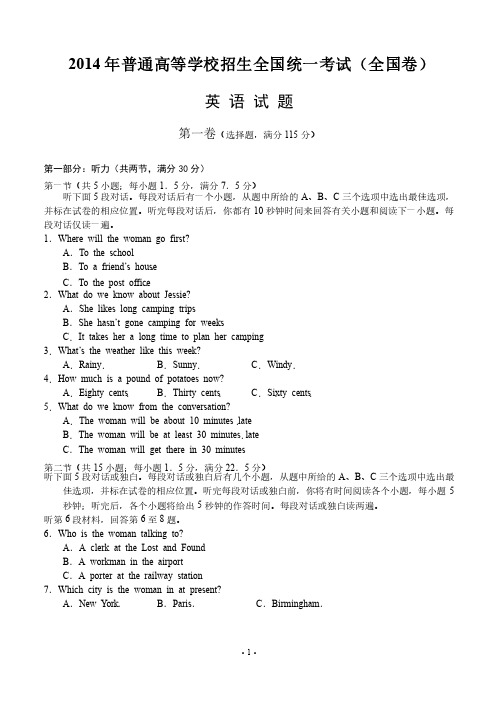
2014年普通高等学校招生全国统一考试(全国卷)英语试题第一卷(选择题,满分115分)分)第一部分:听力(共两节,满分30分)分)第一节(共5小题;每小题1.5分,满分7.5分)听下面5段对话。
每段对话后有一个小题,从题中所给的A、B、C三个选项中选出最佳选项,并标在试卷的相应位置。
听完每段对话后,你都有10秒钟时间来回答有关小题和阅读下一小题。
每段对话仅读一遍。
段对话仅读一遍。
1.Where will the woman go first? A.To the school B.T o a friend’s house.C.To the post office.2.What do we know about Jessie? A.She likes long camping trips.B.She hasn’t gone camping for weeks.C.It takes her a long time to plan her camping.3.What’s the weather like this week?A.Rainy.B.Sunny.C.Windy.4.How much is a pound of potatoes now? A.Eighty cents.B.Thirty cents.C.Sixty cents.5.What do we know from the conversation? A.The woman will be about 10 minutes late.B.The woman will be at least 30 minutes late.C.The woman will get there in 30 minutes.分)第二节(共15小题;每小题1.5分,满分22.5分)听下面5段对话或独白。
每段对话或独白后有几个小题,从题中所给的A、B、C三个选项中选出最佳选项,并标在试卷的相应位置。
2014年高考真题——英语(大纲卷)精品解析版

2014年普通高等学校招生全国统一考试英语(大纲卷)英语第Ⅰ卷第一部分听力(共两节,满分30分)做题时,先将答案标在试卷上。
录音内容结束后,你将有两分钟的时间将试卷上的答案转涂到答题卡上。
第一节(共5个小题:每小题1.5分,满分7.5分)听下面5段对话。
每段对话后有一道小题,从每题所给的A B C三个选项中选出最佳选项,并标在试卷的相应位置。
听完每段对话后,你都有10秒钟的时间来回答有关小题和阅读下一小题。
每段对话仅读一遍。
例:How much is the shirt?A. £19.15B.£9.18C. £9.15答案是C1. What does the woman want to do?A. Find a placeB. Buy a mapC. Get an address2. What will the man do for the woman?A. Repair her carB. Give her a rideC. Pick up her aunt3. Who might Mr. Peterson be?A. A new professor.B. A department head.C. A company director4. What does the man think of the book?A. Quite difficultB. Very interestingC. Too simple5. What are the speakers talking about?A. WeatherB. ClothesC. News第二节(共15小题:每小题1.5分,满分22.5分)听下面5段对话或对白,每段对话或对白后有几个小题,从题中所给的A、B、C三个选项中选出最佳选项,并标在试卷的相应位置,听每段对话或独白前,你将有时间阅读各个小题。
每小题5秒钟;听完后,各小题给出5秒钟的作答时间。
(完整版)2014年高考英语全国卷1
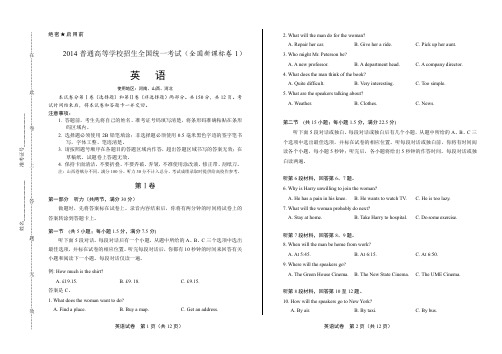
绝密★启用前2014普通高等学校招生全国统一考试(全国新课标卷1)英语使用地区:河南、山西、河北本试卷分第Ⅰ卷(选择题)和第Ⅱ卷(非选择题)两部分。
共150分,共12页。
考试时间结束后,将本试卷和答题卡一并交回。
注意事项:1. 答题前,考生先将自己的姓名、准考证号码填写清楚,将条形码准确粘贴在条形码区域内。
2. 选择题必须使用2B 铅笔填涂;非选择题必须使用0.5毫米黑色字迹的签字笔书写,字体工整、笔迹清楚。
3. 请按照题号顺序在各题目的答题区域内作答,超出答题区域书写的答案无效;在草稿纸、试题卷上答题无效。
4. 保持卡面清洁,不要折叠、不要弄破、弄皱,不准使用涂改液、修正带、刮纸刀。
注:山西卷赋分不同,满分180分。
听力30分不计入总分,考试成绩录取时提供给高校作参考。
第Ⅰ卷第一部分 听力(共两节,满分30分)做题时,先将答案标在试卷上。
录音内容结束后,你将有两分钟的时间将试卷上的答案转涂到答题卡上。
第一节 (共5小题;每小题1.5分,满分7.5分)听下面5段对话。
每段对话后有一个小题,从题中所给的A 、B 、C 三个选项中选出最佳选项,并标在试卷的相应位置。
听完每段对话后,你都有10秒钟的时间来回答有关小题和阅读下一小题。
每段对话仅读一遍。
例: How much is the shirt? A. £19.15.B. £9. 18.C. £9.15.答案是C 。
1. What does the woman want to do? A. Find a place.B. Buy a map.C. Get an address.2. What will the man do for the woman? A. Repair her car.B. Give her a ride.C. Pick up her aunt.3. Who might Mr. Peterson be? A. A new professor.B. A department head.C. A company director.4. What does the man think of the book? A. Quite difficult.B. Very interesting.C. Too simple.5. What are the speakers talking about? A. Weather.B. Clothes.C. News.第二节 (共15小题;每小题1.5分,满分22.5分)听下面5段对话或独白。
2014年高考大纲全国卷英语真题(带解析)
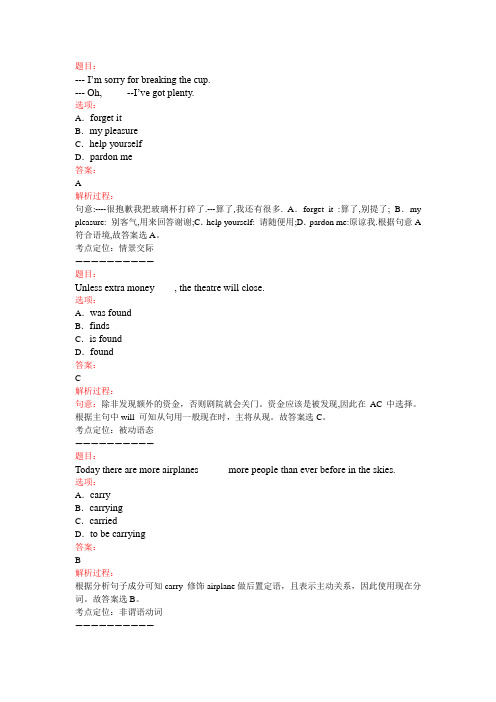
--- I’m sorry for breaking the cup.--- Oh, ____ --I’ve got plenty.选项:A.forget itB.my pleasureC.help yourselfD.pardon me答案:A解析过程:句意:----很抱歉我把玻璃杯打碎了.---算了,我还有很多.A.forget it :算了,别提了; B.my pleasure: 别客气,用来回答谢谢;C.help yourself: 请随便用;D.pardon me:原谅我.根据句意A 符合语境,故答案选A。
考点定位:情景交际——————————题目:Unless extra money____, the theatre will close.选项:A.was foundB.findsC.is foundD.found答案:C解析过程:句意:除非发现额外的资金,否则剧院就会关门。
资金应该是被发现,因此在AC中选择。
根据主句中will 可知从句用一般现在时,主将从现。
故答案选C。
考点定位:被动语态——————————题目:Today there are more airplanes _____ more people than ever before in the skies.选项:A.carryB.carryingC.carriedD.to be carrying答案:B解析过程:根据分析句子成分可知carry 修饰airplane做后置定语,且表示主动关系,因此使用现在分词。
故答案选B。
考点定位:非谓语动词——————————Exactly ____ the potato was introduced into Europe is uncertain, but it was probably around 1565.选项:A.whetherB.whyC.whenD.how答案:C解析过程:根据but后面―大概是在1565年左右‖,可知but前面想表达时间―土豆是什么时候引进到欧洲的还不确定‖,故答案选C。
2014年高考英语试题(全国大纲卷)答案
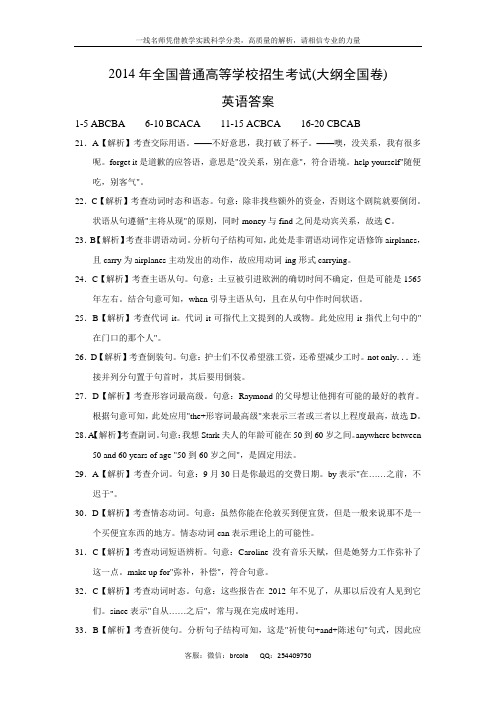
2014年全国普通高等学校招生考试(大纲全国卷)英语答案1-5 ABCBA 6-10 BCACA 11-15 ACBCA 16-20 CBCAB21.A【解析】考查交际用语。
——不好意思,我打破了杯子。
——噢,没关系,我有很多呢。
forget it是道歉的应答语,意思是"没关系,别在意",符合语境。
help yourself"随便吃,别客气"。
22.C【解析】考查动词时态和语态。
句意:除非找些额外的资金,否则这个剧院就要倒闭。
状语从句遵循"主将从现"的原则,同时money与find之间是动宾关系,故选C。
23.B【解析】考查非谓语动词。
分析句子结构可知,此处是非谓语动词作定语修饰airplanes,且carry为airplanes主动发出的动作,故应用动词-ing形式carrying。
24.C【解析】考查主语从句。
句意:土豆被引进欧洲的确切时间不确定,但是可能是1565年左右。
结合句意可知,when引导主语从句,且在从句中作时间状语。
25.B【解析】考查代词it。
代词it可指代上文提到的人或物。
此处应用it指代上句中的"在门口的那个人"。
26.D【解析】考查倒装句。
句意:护士们不仅希望涨工资,还希望减少工时。
not only...连接并列分句置于句首时,其后要用倒装。
27.D【解析】考查形容词最高级。
句意:Raymond的父母想让他拥有可能的最好的教育。
根据句意可知,此处应用"the+形容词最高级"来表示三者或三者以上程度最高,故选D。
28.A【解析】考查副词。
句意:我想Stark夫人的年龄可能在50到60岁之间。
anywhere between50 and 60 years of age "50到60岁之间",是固定用法。
29.A【解析】考查介词。
句意:9月30日是你最迟的交费日期。
2014年高考英语试题单项选择解析(全国大纲卷)
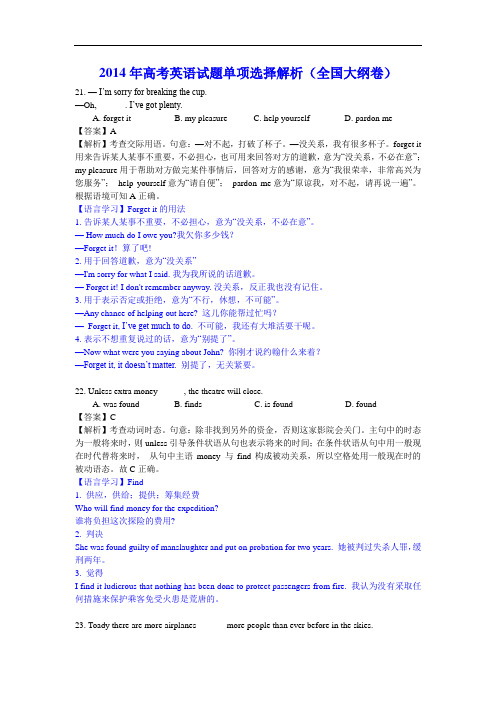
2014年高考英语试题单项选择解析(全国大纲卷)21. —I’m sorry for breaking the cup.—Oh, ______. I’ve got plenty.A. forget itB. my pleasureC. help yourselfD. pardon me【答案】A【解析】考查交际用语。
句意:—对不起,打破了杯子。
—没关系,我有很多杯子。
forget it 用来告诉某人某事不重要,不必担心,也可用来回答对方的道歉,意为“没关系,不必在意”;my pleasure用于帮助对方做完某件事情后,回答对方的感谢,意为“我很荣幸,非常高兴为您服务”;help yourself意为“请自便”;pardon me意为“原谅我,对不起,请再说一遍”。
根据语境可知A正确。
【语言学习】Forget it 的用法1. 告诉某人某事不重要,不必担心,意为“没关系,不必在意”。
— How much do I owe you?我欠你多少钱?—Forget it!算了吧!2. 用于回答道歉,意为“没关系”—I'm sorry for what I said. 我为我所说的话道歉。
— Forget it! I don't remember anyway. 没关系,反正我也没有记住。
3. 用于表示否定或拒绝,意为“不行,休想,不可能”。
—Any chance of helping out here? 这儿你能帮过忙吗?— Forget it, I’ve get much to do. 不可能,我还有大堆活要干呢。
4. 表示不想重复说过的话,意为“别提了”。
—Now what were you saying about John? 你刚才说约翰什么来着?—Forget it, it doesn’t matter. 别提了,无关紧要。
22. Unless extra money______, the theatre will close.A. was foundB. findsC. is foundD. found【答案】C【解析】考查动词时态。
2014年普通高等学校招生全国统一考试英语试题(大纲版,解析版)
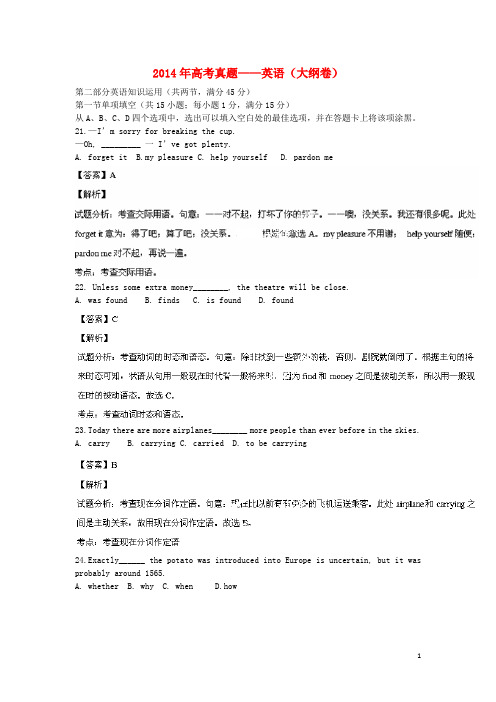
2014年高考真题——英语(大纲卷)第二部分英语知识运用(共两节,满分45分)第一节单项填空(共15小题;每小题1分,满分15分)从A、B、C、D四个选项中,选出可以填入空白处的最佳选项,并在答题卡上将该项涂黑。
21.—I’m sorry for breaking the cup.—Oh, _________ 一 I’ve got plenty.A. forget itB.my pleasureC. help yourselfD. pardon me22. Unless some extra money________, the theatre will be close.A. was foundB. findsC. is foundD. found23.Today there are more airplanes________ more people than ever before in the skies.A. carryB. carryingC. carriedD. to be carrying24.Exactly______ the potato was introduced into Europe is uncertain, but it was probably around 1565.A. whetherB. whyC. whenD.how25.—Who’s that at the door?—is the milkman.A. HeB. ItC. ThisD. That4) 特殊的形式宾语it。
enjoy, like, dislike, love, hate, prefer, appreciate等表示“喜欢、恨”等心理方面的动词后接 if 从句或 when 从句,通常应先在动词后接 it 作形式宾语。
如:I will appreciate it if you can give me a hand.5)用于强调句中:It is/was…that/who。
- 1、下载文档前请自行甄别文档内容的完整性,平台不提供额外的编辑、内容补充、找答案等附加服务。
- 2、"仅部分预览"的文档,不可在线预览部分如存在完整性等问题,可反馈申请退款(可完整预览的文档不适用该条件!)。
- 3、如文档侵犯您的权益,请联系客服反馈,我们会尽快为您处理(人工客服工作时间:9:00-18:30)。
2014年普通高等学校招生全国统一考试(大纲卷)英语本试卷分为第Ⅰ卷(选择题)和第Ⅱ卷(非选择题)两部分,共150分,考试时间120分钟。
考生务必将答案涂写在答题卡上,答在试卷上的无效。
考试结束后,将本试卷和答题卡一并交回。
第Ⅰ卷第一部分听力(共两节,满分30分)做题时,先将答案标在试卷上。
录音内容结束后,你将有两分钟的时间将试卷上的答案转涂到答题卡上。
第一节(共5小题;每小题1.5分,满分7.5分)听下面5段对话。
每段对话后有一个小题,从题中所给的A、B、C三个选项中选出最佳选项,并标在试卷的相应位置。
听完每段对话后,你都有10称钟的时间来回答有关小题和阅读下一小题。
每段对话仅读一遍。
例:How much is the shirt?A. £19.15.B. £9.18.C. £9.15. 答案是C。
1. What does the woman want to do?A. Find a place.B. Buy a map.C. Get an address.2. What will the man do for the woman?A. Repair her car.B. Give her a ride.C. Pick up her aunt.3. Who might Mr. Peterson be?A. A new professor.B. A department head.C. A company director.4. What does the man think of the book?A. Quite difficult.B. Very interesting.C. Too simple.5. What are the speakers talking about?A. Weather.B. ClothesC. News.第二节(共15小题;每小题1.5分,满分22.5分)听下面5段对话或独白。
每段对话或独白后有几个小题,从题中所给的A、B、C三个选项中选出最佳选项,并标在试卷的相应位置。
听每段对话或独白前,你将有时间阅读各个小题,每小题5秒钟;听完后,各小题将给出5秒钟的作答时间。
每段对话或独白读两遍。
听第6段材料,回答第6至7题。
6. Why is Harry unwilling to join woman?A. He has a pain in his knee.B. He wants to watch TV.C. He is too lazy.7. What will the woman probably do next?A. Stay at home.B. Take Harry to hospital.C. Do some exercise.听第7段材料,回答第8 、9题。
8. When will the man be home from work?A. At 5:45.B. At 6:15.C. At 6:50.9. Where will the speakers go?A. The Green House Cinema.B. The new State Cinema.C. The UME Cinema.听第8段材料,回答第10至12题。
10. How will the speakers go to New York?A. By air.B. By taxi.C. By bus.11. Why are the speakers making the trip?A. For business.B. For shopping.C. For holiday.12. What is the probable relationship between the speakers?A. Driver and passenger.B. Husband and wife.C. Fellow workers.听第9段材料,回答第13至16题。
13. Where does this conversation probably take place?A. In a restaurant.B. In an office.C. In a classroom.14. What does John do now?A. He’s a trainer.B. He’s a tour guide.C. He’s a college student.15. How much can a new person earn for the first year?A. $10,500.B. $12,000.C. $15,000.16. How many people will the woman hire?A. Four.B. Three.C. Two.听第10段材料,回答第17至20题。
17. How long has the speaker lived in a big city?A. One year.B. Ten years.C. Eighteen years.18. What is the speaker’s opinion on public transport?A. It’s comfortable.B. It’s time-saving.C. It’s cheap.19. What is good about living in a small town?A. It’s safer.B. It’s healthier.C. It’s more convenient.20. What kind of life does the speaker seem to like most?A. Busy.B. Colorful.C. Quiet.第二部分英语知识运用(共两节,满分45分)第一节单项填空(共15小题;每小题1分,满分15分)从A、B、C、D四个选项中,选出可以填入空白处的最佳选项,并在答题卡上将该涂黑。
例:It is generally considered unwise to give a child____ he or she wants. 答案是B。
A. howeverB. whateverC. whicheverD. whenever21. ---I’m sorry for breaking the cup.---Oh, I’ve gotA. forget itB. my pleasureC. help yourselfD. pardon me22. Unless some extra money , the theatre will close.A. was foundB. findsC. is foundD. found23. Today there are more airplanes more people than ever before in the skies.A. carryB. carryingC. carriedD. to be carrying24. Exactly the potato was introduced into Europe is uncertain, but it was probably around 1565.A. whetherB. whyC. whenD. how25. ---Who’s that the door?--- is the milkman.A. HeB. ItC. ThisD. That26. the nurses was a pay increase, they want reduced hours as well.A. Not do onlyB. Do not onlyC. Only not doD. Not only do27. Raymond’s parents wanted him to have possible education.A. goodB. betterC. bestD. the best28. I think Mrs. Stark could be between 50 and 60 years of age.A. anywhereB. anybodyC. anyhowD. anything29. September 30 is the day which you must pay your bill.A. byB. forC. withD. in30. Although you find bargains in London, it’s not generally a clean place to shop.A. shouldB. needC. mustD. can31. Caroline doesn’t have a gift for music, but she it with hard work.A. goes back onB. takes away fromC. makes up forD. Catches up with32. The reports went missing in 2012 and nobody them since.A. seesB. sawC. has seenD. had seen33. me tomorrow and I’ll let you know the lab result.A. CallingB. CallC. To callD. Having called34. Henry was away from home for quite a bit and saw his family.A. frequentlyB. seldomC. alwaysD. usually35. ---What did you do last weekend?---Oh, nothing .A. muchB. elseC. everD. yet第二节完形填空(共20小题:每小题1.5分,满分30分)阅读下面短文,从短文后各题所给的四个选项(A、B、C、D)中,选出可以填入空白处的最佳选项,并在答题卡上将该项涂黑Joe Simpson and Simon Yates were the first people to climb the West Face of the Siula Grande in the Andes mountains. They reached the top 36 , but on their way back conditions were very 37 . Joe fell and broke his leg. They both knew that if Simon 38 alone, he would probably get back 39 . But Simon decided to risk his and try to lower Joe down the mountain on a rope(绳).As they 41 down, the weather got worse. Then another 42 occurred. They couldn’t see or hear each other and 43 , Simon towered his friend over the edge of a precipice(峭壁). It was 44 for Joe to climb back for Simon had to pull him up. Joe’s 45 was pulling Simon slowly towards the precipice. 46 , after more than an hour in the dark and the icy cold, Simon had to 47 . In tears, he cut the rope. Joe 48 into a huge crevasse(裂缝) in the ice below. He had no food or water and he was in terrible pain. He couldn’t walk, but he 49 to get out of the crevasse and started to 50 towards their camp, nearly ten kilometers 51 .Simon had 52 the camp at the foot of the mountain. He thought that Joe must be 53 , but he didn’t want to leave 54 . Three days later, in the middle of the night, he heard Joe’s voice. He couldn’t 55 it. Joe was there, a few meters from their tent, still alive.36. A. hurriedly B. carefully C. successfully D. early37. A. difficult B. similar C. special D. normal38. A. climbed B. worked C. rested D. continued39. A. unwillingly B. safely C. slowly D. regretfully40. A. fortune B. time C. health D. life41. A. lay B. settled C. went D. looked42. A. damage B. storm C. change D. trouble43. A. by mistake B. by chance C. by choice D. by luck44. A. unnecessary B. practical C. important D. impossible45. A. height B. weight C. strength D. equipment46. A. Finally B. Patiently C. Surely D. Quickly47. A. stand back B. take a rest C. make a decision D. hold on48. A. jumped B. fell C. escaped D. backed49. A. managed B. planned C. waited D. hoped50. A. run B. skate C. move D. march51. A. around B. away C. above D. along52. A. headed for B. traveled to C. left for D. returned to53. A. dead B. hurt C. weak D. late54. A. secretly B. tiredly C. immediately D. anxiously55. A. find B. believe C. make D. accept第三部分阅读理解(共20小题;每小题2分,满分40分)阅读下列短文,从每题所给的四个选项(A、B、C和D)中,选出最佳选项,并在答题卡上将该项涂黑。
